droit law F[O]CUS

2022-2023
À l’avant-garde du droit Inspiring legal leadership for global challenges
COMMUNITY

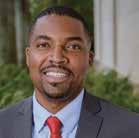
Merci, Lysanne !
Après avoir contribué à toutes les éditions de Focus Law / Droit depuis 2007, notamment à titre de rédactrice-en-chef, membre du comité éditorial et photographe, Lysanne Larose a rendu son stylo rouge et accroché sa Nikon. Merci, Lysanne, pour tous ces souvenirs que tu nous as aidés à immortaliser!

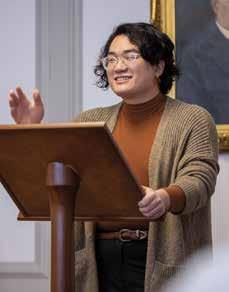
The joy of returning to a vibrant campus Cover illustration by Johan Papin
Focus Law / Droit est publié par l’équipe des communications de la Faculté de droit de McGill. Faculté de droit Université McGill 3644, rue Peel Montréal (Québec) H3A 1W9 www.mcgill.ca/law focuslaw.mcgill.ca comms.law@mcgill.ca
In this issue EN VEDETTE 8 Learning law from the land, on the land 11 Business, not as usual 13 In-house leaders 16 Putting racist policing on trial 21 The BCL/JD turns 20 À LA FACULTÉ 2 Nouvelles embauches professorales 5 Faculty News 7 Une honorable visite 26 The Frederick Phillips Summer Program 28 Deux survivantes de la purge LGBTQ des Forces armées canadiennes honorées à la Faculté 30 Can solitary confinement be reformed or abolished in Canada?
18 S’impliquer pour épauler la relève 32 Retour resplendissant de la cérémonie de collation des grades 34 Outstanding alumni honoured by the McGill Alumni Association 36 In Memoriam 37 Alumnotes 45 The Chancellor Day Circle
EN CHEF Karell
EDITORIAL ADVISORY BOARD Robert
Vanessa Batik Heather Powers Aminata Mboup CONTRIBUTORS Maeve
Aminata
Patrick
Karell Michaud
ET MISE EN PAGE Steven McClenaghan McGill Graphic Design Studio
ALUMNI
RÉDACTRICE
Michaud
Leckey
Haldane
Mboup
McDonagh
DESIGN
Lysanne
Dee
Alex
droit
F[
]
PHOTOGRAPHES Joni Dufour Owen Egan Paul Fournier Kejic Productions
Larose
M’Bow
Tran
law
O
CUS
2022-2023
8 21 28 16
Dean’s Word
by Dean Robert Leckey
My conversations with alumni in wildly differing roles converge on the value to them of McGill Law’s distinctive legal education in their daily lives. I think of an international arbitrator, a senior counsel in a multinational firm, and a budding entrepreneur. All draw on strengths that characterize how we teach and research law: a grasp of legal fundamentals; creativity, rigour, and the ability to cross borders of varying kinds; and confidence navigating uncertainty. And we remain committed to equipping our students with knowledge and skills for tackling today’s challenges and tomorrow’s. In short, 20 years after students first completed our integrated program, a McGill legal education remains more important than ever.
Je sens que vous partagez mon opinion. Au cours de la dernière année, vous avez plus interagi que jamais avec nous sur les réseaux sociaux. La générosité dont vous faites preuve pour soutenir notre mission universitaire et notre talentueuse communauté étudiante s’est traduite en une année phénoménale sur le plan philanthropique. Merci !

Our first in-person convocations in three years were joyous occasions. We converged on McGill’s lower campus under the big tent. We hosted the Class of ’22 and their loved ones at a cocktail in the Faculty Club, complete with jazz band. I was touched by the distances travelled by graduates and their families and moved by hearing from parents of the positive impact that McGill’s legal education had on their children. Graduates from ’20 and ’21 crossed a different kind of distance, coming back much later than usual after their last exam. Many had been sworn into a Bar over Zoom, making our catch-up ceremony the sole in-person celebration of their transition from student to legal professional.
Si toute philanthropie vient du fond du cœur, j’ai été particulièrement touché par des dons collectifs faits en hommage à des membres de notre communauté diplômée peu après leur décès. Les proches de Pierre Hébert, BCL’69, de Norton Rose Fulbright, se sont rapidement mobilisés pour fonder une bourse en son nom. Des spécialistes en droit familial du Barreau de Montréal ont collaboré afin de créer un stage qui sera offert en perpétuité en hommage à l’honorable Eva Petras, BCL’80, LLB’80, juge en chef adjointe de la Cour supérieure du Québec.
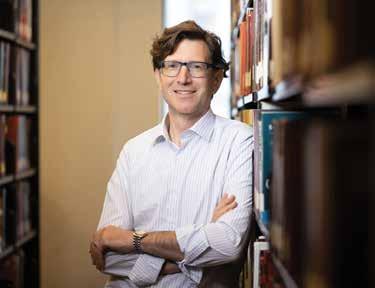
As we spend less time in emergency meetings about COVID, we can again foreground efforts to renew the faculty and our program in key areas. Strengthening the place of business law. Advancing Indigenization, including plans for a stunning Indigenous learning space that will be a first for McGill. Better supporting Black students and others from groups historically underrepresented. I acknowledge that students can be understandably impatient to see immediate change, while institutions two centuries old sometimes struggle to be sufficiently nimble.
Merci de continuer à soutenir la Faculté de droit. J’espère vous revoir bientôt, au pavillon Chancellor-Day ou ailleurs. D’ici là, connectons-nous sur LinkedIn pour que vous puissiez nous donner de vos nouvelles et suivre le quotidien de votre Faculté !
of Law
LE MOT DU DOYEN
1 @DeanLeckey
Ad. E. Dean and Samuel Gale Professor
OWEN EGAN
Nouvelles embauches professorales
Trois personnes viendront joindre les rangs facultaires en 2022-2023, apportant de l’expertise en droit administratif et algorithmes de prise de décisions, en accès à la justice et en tribunaux non-professionnels, ainsi qu’en droit privé et droit des biens.
JENNIFER RASO s’est jointe à la Faculté de droit à titre de professeure adjointe le 1er août, et enseigne la procédure administrative ainsi que la pauvreté et le droit. Une spécialiste du droit administratif et de la prise de décisions algorithmique, elle est la chercheuse principale d’un projet intitulé « Shifting Front Lines in the Digital Welfare State: Coding Canadian Social Assistance Laws », soutenu par une subvention de développement Savoir du Conseil de recherche en sciences humaines.

How did you become interested in administrative law and data-driven technologies?
I’ve always been interested in how laws are brought to life in everyday settings. For many people, that experience occurs through their interactions with “front-line” officials, such as filing taxes or crossing a border. These decisions are governed by administrative law, but they are also increasingly governed by data-driven technologies. Contrary to the assumption that bureaucracies are slow-moving, government agencies are sometimes the first to use innovative new technologies (computerized data management systems in welfare programs are an early example). Today, these tools are becoming deeply embedded within administrative agencies without a full appreciation of their social and legal consequences.
What’s a legal question that currently fascinates you?
How do interfaces mediate crucial interactions between the public and government officials? Today, most people have experienced “digital-first” government: that is, government via website, app, or kiosk. The information
each of us provides about our circumstances is filtered through an online form or telephone menu, which shapes how it is understood by the human official(s) on the other side. Interfaces influence how these “claims” are presented and received. They moderate how senses of administrative (in)justice develop, and how (dis)trust in state agencies is fostered. I’m interested in how these tools are reshaping law and discretion when they moderate highly impactful decisions made in front-line settings like social assistance and border control.
What do you most look forward to about joining McGill Law?
I am keen to join a law school that is so obviously committed to multidisciplinary, cross-cultural exchange. This feature sets McGill Law apart from other Canadian law schools and makes it an ideal environment in which to examine the contemporary dilemmas posed by algorithmic or data-driven governance. A key component of this unique environment is the law school’s diverse student body. I cannot wait to get to know them better in the classroom and beyond.
FOCUS LAW / 2022-2023 / M C GILL UNIVERSITY 2 NOUVELLES DE LA FACULTÉ
JÉRÉMY BOULANGER-BONNELLY, BCL/LLB’15, se joindra à la Faculté de droit à titre de Boursier Boulton junior le 1er janvier 2023 et accédera au rang de professeur adjoint le 1er août 2023. Terminant actuellement un SJD à l’Université de Toronto, où il est boursier Vanier et boursier de la Fondation Pierre Elliott Trudeau, il s’intéresse à l’accès à la justice et son intersection avec la procédure civile, la résolution de différends, le droit comparé et le droit constitutionnel.

Comment est né votre intérêt pour votre domaine de recherche?
C’est d’abord en tant qu’étudiant à McGill que j’ai pris conscience de la crise d’accès à la justice, mais c’est véritablement en tant qu’avocat de litige que j’en ai mesuré toute l’ampleur, surtout pour les plus vulnérables. C’est ce constat qui me motive encore aujourd’hui à consacrer mes recherches aux diverses facettes de cet enjeu complexe. Celui-ci est d’autant plus intéressant qu’il se situe à l’intersection de plusieurs domaines de droit plus traditionnels comme la procédure civile, le droit constitutionnel ou même l’éthique et la déontologie professionnelles.
Quelle question juridique vous fascine à l’heure actuelle?
J’explore depuis quelques années déjà l’idée de mettre à profit la participation citoyenne afin de rendre la justice civile plus accessible. Nous connaissons déjà très bien les jurys, qui permettent aux citoyens d’agir comme décideurs l’instant d’un dossier, mais d’autres modèles qui se développent ailleurs dans le monde donnent un rôle encore plus actif aux justiciables, qu’il s’agisse de cours mixtes ou de tribunaux entièrement non-professionnels. Je m’intéresse aux contributions potentielles de ces modèles, mais aussi aux écueils qu’ils doivent éviter pour demeurer légitimes et compétents dans un système de justice aussi professionnalisé que le nôtre.
Qu’est-ce qui vous a mené de la pratique professionnelle du droit aux études supérieures et à une carrière universitaire?
J’ai toujours eu un intérêt pour une carrière universitaire, mais je souhaitais d’abord comprendre comment le droit se pratique sur le terrain. J’ai eu la chance de travailler des deux côtés du banc, d’abord en tant qu’auxiliaire juridique auprès de la magistrature, puis en tant qu’avocat de litige. Ces expériences nourrissent mes recherches et mon enseignement en me fournissant des exemples concrets qui sont souvent le point de départ de réflexions plus théoriques. C’est encore plus vrai en droit judiciaire et en procédure civile, un domaine où les règles de droit sont souvent indissociables des pratiques qui guident leur application.
3
KONSTANZE VON SCHÜTZ se joindra à la Faculté de droit à titre de Boursière Wainwright junior le 1er janvier 2023 et accédera au rang de professeure adjointe le 1er août 2023. Auparavant chercheuse en droit privé au Center for the Study of Private Law à l’Université Yale, elle s’intéresse aux idées fondamentales et aux composantes constituantes du droit privé de points de vue théoriques, comparatifs et historiques.

How did you become interested in private law/property law?
Since my student days, I have been interested in how private law establishes rules that set up a framework for the permissible pursuit of private interests. This larger issue pervades even some of the most “technical” doctrinal elements. Who can enter into enforceable agreements about what? When does pursuing my interests turn into actionable harm for others? In property law, this issue underlies questions such as “What can I permissibly do with the things considered to be ‘mine’?” Studying how different legal systems respond to these questions has captivated me ever since.
Quelle question juridique vous fascine à l’heure actuelle?
Je m’intéresse beaucoup à la « propriété publique » et à la façon dont le public et le privé s’y manifestent. Le propriétaire privé semble être le cas paradigmatique, tandis que l’existence de propriétaires publiques invite à recalibrer la place de l’intérêt public dans le rôle d’un propriétaire. Cela soulève aussi des questions fondamentales sur la nature de l’autorité publique. De plus, les conceptions de ce qu’est la propriété publique varient considérablement d’une tradition juridique à l’autre. Des juridictions mixtes comme le Québec présentent donc des cas d’étude extrêmement stimulants pour s’intéresser à ces enjeux.
What do you most look forward to about joining McGill Law?
I am really thrilled to meet everyone who works, researches, studies, and teaches at the faculty, and I will be delighted to connect with the alumni community. I eagerly look forward to partaking in the Faculty’s vibrant intellectual life, including but of course not limited to the activities of the Paul-André Crépeau Centre for Private and Comparative Law. And I have heard great things about the library collection and certainly plan to go explore it.
FOCUS LAW / 2022-2023 / M C GILL UNIVERSITY 4
“I eagerly look forward to partaking in the Faculty’s vibrant intellectual life.”
Faculty News
McGill
Yaëll Emerich a été nommée titulaire de la Chaire de recherche du Canada (niveau 1) en droit des biens transsystémique et communautés durables. Elle a également remporté le Prix Germain-Brière catégorie senior) pour son article « La résurgence des communs en droit des biens contemporains : étude sur les cohabitats écologiques et les ruelles vertes ».
Ignacio Cofone a été nommé titulaire de la Chaire de recherche du Canada (niveau 2) sur le droit de l’intelligence artificielle et la gouvernance des données.

Ram S. Jakhu and Pierre-Emmanuel Moyse were promoted to full professor, in November 2021 and June 2022, respectively.
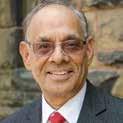
Fabien Gélinas, Ad E, a reçu la médaille Paul-André-Crépeau de l’Association du Barreau canadien, Division du Québec.

Robert Leckey, Ad E, a reçu la distinction Avocat émérite du Barreau du Québec.
Marie Manikis a remporté le prix du Concours d’essai juridique de l’Association canadienne des professeurs de droit (ACDP) pour son article « Recognising State Blame in Sentencing : A Communicative and Relational Framework ». Ignacio Cofone a reçu une mention d’honneur pour son article « Immunity Passports and Contact Tracing Surveillance ».
René Provost, FRSC, Ad E, received the annual prize for best book of the International Society of Public Law (ICON·S) for his monograph Rebel Courts: The Administration of Justice by Armed Insurgents (Oxford University Press, 2021).

Recently published books
• Allison Christians, Tax Cooperation in an Unjust World (Oxford University Press, 2022)
Helge Dedek (ed.), A Cosmopolitan Jurisprudence: Essays in Memory of H. Patrick Glenn (Cambridge University Press, 2022)
Andrea K. Bjorklund was appointed to the Panel of Arbitrators for the International Centre for Settlement of Investment Disputes. She was also appointed to the newly established Hague Court of Arbitration for Aviation, along with Dr. Donal Hanley, interim director of the Institute of Air and Space Law.
Johanne Poirier a été reconduite comme titulaire de la chaire Peter MacKell en fédéralisme. Elle a également reçu le prix John W. Durnford d’excellence en enseignement, décerné par l’Association des étudiant.e.s en droit.


Tina Piper has been appointed associate dean (academic) and Darren Rosenblum has been appointed associate dean (graduate studies), for two-year terms.
• Ram S. Jakhu (co-ed.), McGill Manual on International Law Applicable to Military Uses of Outer Space, volume I – Rules (online)
• Colleen Sheppard, Discrimination Stories: Exclusion, Law, and Everyday Life (Irving Law, 2021)
Shauna Van Praagh, Building Justice: Frank Iacobucci and the Life Cycles of Law (University of Toronto Press, 2022)
François Crépeau, OC, OQ, MSRC, Ad E, a été admis à l’Ordre national du Québec à titre d’officier.
Mugambi Jouet took up a position at the Gould School of Law, University of Southern California, in August 2022.
Adelle Blackett, FRSC, Ad E, has received an honorary doctorate of laws (LLD) from Queen’s University in October 2022.
5
NOUVELLES DE LA FACULTÉ
Law was ranked the 17th best law school worldwide for two consecutive years in the 2022 and 2023 Times Higher Education World University Rankings. Quacquarelli Symonds (QS) placed the Faculty 31st in the world.
Caroline Monnet

Suzanne (Fragment Series) 1/3, 2019, Photograph, 62.7 x 62.7 cm. Purchased with the support from the Faculty of Law. McGill Visual Arts Collection, 2022-006.002. © Caroline Monnet.
Le bibliothécaire en chef et bibliothécaire Wainwright Daniel Boyer, Ad E, a pris sa retraite, après vingt-quatre années à la bibliothèque Nahum-Gelber. Lorsque la distinction d’Advocatus Emeritus lui a été conférée en 2018, le Barreau du Québec a souligné que la bibliothèque Nahum-Gelber était « un modèle parmi les bibliothèques de droit comparé du monde ».
Nouvelle œuvre d’art au pavillon Chancellor-Day
Caroline Monnet est une artiste multidisciplinaire d’origine algonquine-française. En 2021, elle a été la première artiste autochtone en résidence des Mellon Indigenous Studies and Community Engagement Initiatives à l’Université McGill.
Dans la série intitulée Fragment, Monnet a photographié des sujets portant des masques en plastique transparent couverts d’un dessin géométrique noir. Ce dessin combine des motifs transmis par ses matriarches et de vues aériennes du système seigneurial de distribution des terres imposé par les colons européens sur les territoires autochtones non cédés. Sur ces voiles carrés transparents, les formes géométriques deviennent une lentille à travers laquelle le sujet nous regarde et nous regardons le sujet. Dans cette œuvre, Monnet rend visible une perspective autochtone et nous invite à réfléchir à la nôtre.

New Faculty appointments
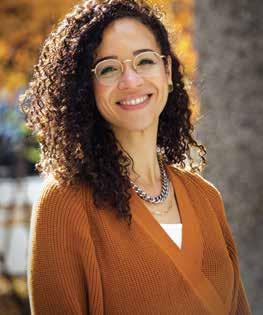
Sarah Riley Case (pictured below) began as assistant professor on 1 August, following a year as Boulton junior fellow. Jennifer Raso joined McGill Law as assistant professor on 1 August. Konstanze von Schütz and Jérémy Boulanger-Bonnelly will begin on 1 January 2023, as a Wainwright junior fellow and a Boulton junior fellow, respectively, before transitioning to assistant professor on 1 August 2023. Meet our new Faculty members on page 2.
Maria Marcheschi retired after thirty-four years of service. Maria oversaw events planning for the Faculty of Law, including class reunions during Homecoming celebrations.
Vanessa Batik s’est jointe au personnel administratif à titre de doyenne adjointe (administration et stratégie).
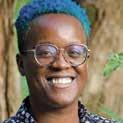
Brittany Williams, BCL/LLB’19, a été nommée doyenne adjointe (vie étudiante) et déléguée du doyen pour l’épanouissement des étudiant.e.s noir.e.s et autochtones.
Elle a auparavant tenu le rôle de doyenne adjointe (admissions) par intérim et de directrice du Secrétariat aux études.
Lionel Smith was elected the fifteenth Downing Professor of the Laws of England at Cambridge University, UK, and took up the position in the autumn of 2022.
Rosalie Jukier received McGill University’s Morty Yalovsky Lifetime Achievement Award for Excellence in Academic Leadership at the University’s Fall 2022 Convocation on 26 October. This award recognizes her lifetime contribution as an outstanding leader and institution builder at McGill.
6 FOCUS LAW / 2022-2023 / M C GILL UNIVERSITY
Une honorable visite
La nomination de Mahmud Jamal, BCL’93, LLB’93, à la Cour suprême du Canada, le 1er juillet 2021, a été unanimement acclamée dans le monde juridique canadien. Juge à la Cour d’appel de l’Ontario au moment de l’annonce, Mahmud Jamal a fait ses débuts comme avocat en litige avec un fort engagement pro bono. Au cours de sa carrière, il est apparu 35 fois devant le plus haut tribunal du pays, où il siège aujourd’hui aux côtés de deux autres diplômés de la Faculté : la juge Sheilah Martin, BCL’81, LLB’81, ainsi que le juge Nicholas Kasirer, BCL’85, LLB’85. Professeur auxiliaire à la Faculté de droit, il y a enseigné le droit constitutionnel.
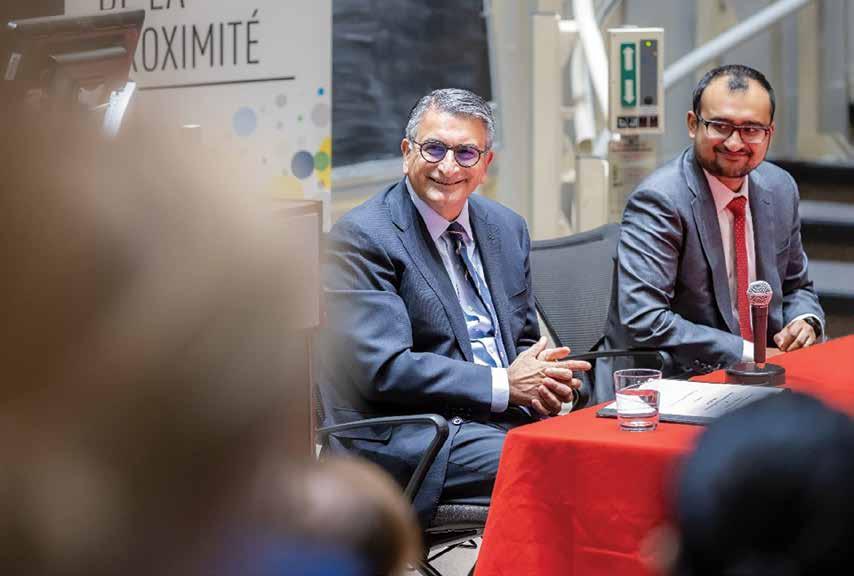
Pour la deuxième fois depuis 2021, la Faculté de droit a eu le privilège d’accueillir son illustre diplômé pour une causerie avec la communauté étudiante. Le juge Jamal a discuté de ses études en droit, de sa carrière d’avocat, puis de ses fonctions judiciaires. L’auditoire a ensuite eu l’occasion de lui adresser des questions, avant de prendre part à une réception dans l’atrium. Organisé en partenariat avec l’Association du Barreau canadien, cet événement était ouvert aux corps étudiants de toutes les facultés de droit du Québec, offrant une belle occasion de tisser des liens entre collègues de facultés voisines. Le 4 novembre, la Faculté de droit a accueilli à leur tour l’honorable Sheilah Martin et l’honorable Nicholas Kasirer pour une séance de questions et réponses organisée en collaboration avec l’Association des étudiant.e.s en droit de McGill. Revivez cet événement en photos sur focuslaw.mcgill.ca.
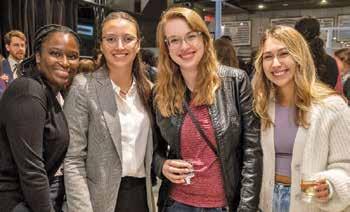
7
NOUVELLES DE LA FACULTÉ
la Faculté de droit a eu le plaisir d’accueillir de nouveau l’honorable
réception a
de nouvelles rencontres parmi
de facultés voisines.
Le 22 septembre,
Mahmud Jamal, BCL’93, LLB’93, en partenariat avec l’Association du Barreau canadien, division du Québec. La
permis
collègues
PHOTOS BY OWEN EGAN AND JONI DUFOUR
Learning law from the land, on the land
 By Patrick McDonagh
Photos by Kejic Productions
By Patrick McDonagh
Photos by Kejic Productions
FOCUS LAW / 2022-2023 / M C GILL UNIVERSITY 8 FEATURE
This summer, 14 law students headed to Winnipeg to enjoy an unprecedented educational experience with Professor Aaron Mills: a four-week field study course in Anishinaabe law, taught in partnership with the Treaty Relations Commission of Manitoba (TRCM). The course was based at The Forks in Winnipeg, and the students stayed in a university residence. Funding from one of McGill’s Tomlinson Chairs provided a modest contribution towards expenses for every participant; additional needs-based funding was made available to cover flight and accommodation.
In 2020, responding to the Truth and Reconciliation Commission’s call to engage with Indigenous legal systems, McGill Law introduced a new mandatory course for first-year law students entitled “Indigenous Legal Traditions.”

The Anishinaabe Law Field Study course picks up where this introductory course ends. “This course fully engages Indigenous law on its own terms,” says Mills, who holds the Canada Research Chair in Indigenous Constitutionalism and Philosophy and is Anishinaabeg. “To do that we had to get out of the law school and onto the land, interacting with Indigenous community members.”
With this goal in mind, Mills worked with two traditional Anishinaabe knowledge-holders as co-teachers: Elder Harry Bone and Grandmother Sherry Copenace “They’ve been my teachers for many years, and we bring very different gifts into a circle while sharing the same commitment,” says Mills, who stresses that he has been on a fifteen-year journey, guided by his grandmother, who passed away a year ago, and other elders, to understand Anishinaabe law more fully. “My long-running relationships with them have provided the foundation of this course,” he underscores.
While the differences between Anishinaabe law and the European-based civil and common law traditions are profound, “they perform the same social functions in a very different way,” says Mills. To help students understand it as law rather than just culture, the first week of the course explored Anishinaabe constitutionalism informing its legal understanding. “The Anishinaabe interpretation of the world is that everything is
connected, that the earth is inherently good, and the relationships between things are instructive for us, because it’s all part of Creator’s vision of balance and harmony. So the fundamental question of social life isn’t ‘the social contract tradition’ where we ask ‘What is a just society, and what institutions and processes are necessary to create and to sustain it?’ Instead, it is ‘How do we fit in to the order which already exists?’ ” Anishinaabe law is often expressed in narratives teachings embedded in stories, songs and ceremonies that must then be interpreted within the context of an event or conflict. “Instead of a set law, there is only legal reasoning, because in every case, you have to reason towards your answer,” Mills explains. As Mill’s co-teacher Grandmother Sherry Copenace points out, “The law is not meant to force people to do things. Rather we want people, based on whatever teaching we provide them with, to want to comply for their own wellness and for the wellness of society. It’s up to the individual to interpret how to live their responsibility in regard to that law.”
9
The field course featured regular outings for land-based learning.
Committed to community-based learning, the class was based on learning circles.
The teachers explored Anishinaabe law in a manner that aligned with Anishinaabe ways of learning. “Typically, we started the day with teachings from Elders or other knowledge keepers on the concept we were discussing, and then we would go around in a circle to share what that meant for us,” says Catherine Dunne, who was entering her second year of studies. At the end of each week, the students would submit written reflections on their learning. “At the start, we wanted the students to find ways on their own to understand the ideas,” Copenace says. But the first set of weekly reflections showed that students were struggling with the fundamental concepts, so the following week the teachers offered concrete examples. “That’s how they were used to learning but we told them, this is a gift, because it’s not how we usually teach or learn,” Copenace explains.
Students engaged with Anishinaabe law not only in their Monday to Thursday learning circles, but also on Friday field trips, which included a visit to the ancient Whiteshell petroforms at Bannock Point, where an Elder explained their connection to Anishinaabe origin stories. “We were able to go out onto the land for ceremonies, such as participating in a sweat lodge ceremony, and I felt that the wide range of experiences really helped me to have a fuller picture of Anishinaabe law,” says fourthyear student Ellen Spannagel. “The course challenged me in all the right ways. It’s been the best experience of my legal education because not only did I learn a lot about Anishinaabe law on its own terms, but I built valuable relationships with people in my cohort, with the knowledge holders, and with Professor Mills and his family. That sense of community really helped the course come alive.” Indeed, a sense of community is an important feature of Anishinaabe law and, to foster this, Mills organized weekly dinners for all participants.
All participants expressed hope that the course would become a regular feature of the curriculum. “I thought it was very courageous on McGill’s behalf, and a big step for any university, to come to Manitoba and partner with the TRCM to present this course,” Copenace concluded. “What Professor Mills and McGill have done is say that Indigenous law has always been here and it’s important.”

“
10 FOCUS LAW / 2022-2023 / M C GILL UNIVERSITY
The wide range of experiences really helped me to have a fuller picture of Anishinaabe Law.”
Business not as usual
By
How does litigation play a role in fighting climate change? How can period-tracking app providers uphold privacy once Roe v. Wade is overturned? Who owns the rights to an artwork created using artificial intelligence? Through initiatives of the Professorship in Business Law , McGill Law students are sharpening their critical skills by engaging with timely legal issues.
When it was established, the vision for McGill’s Professorship in Business Law was that the Faculty’s distinctive integrated approach had much to contribute to this field. Soon entering its third year of activity, the Professorship is living up to its promise by creating spaces for reflection on the intersection of business and society.


“I understand my role to be about mentorship, support, and training to prompt and encourage the next generation to unpack complexities, formulate informed opinions, and make their voices be heard,” highlights Professor Peer Zumbansen. As the inaugural incumbent of the Professorship, he has been laying the foundations for a hub of excellence in business law at McGill, on par with the Faculty’s recognized strengths such as human rights and dispute resolution. Through two of the Professorship’s flagship initiatives the McGill Business Law Meter and the Seminars on Business & Society the Faculty of Law is hosting critical conversations on how business law has its role to play in building a more inclusive, sustainable, and just world.
McGill Business Law Meter
Inspired by examples at Harvard Law School and the University of Oxford, the McGill Business Law Meter is a first at a Canadian law faculty. Housed on the McGill Business Law Platform an online hub for the Faculty’s corporate and business law activities the blog provides a bilingual space for contributors to engage with developments in the field. Unlike prior examples, which primarily publish texts by professors and legal practitioners, “the Meter almost exclusively publishes students’ work, giving them the chance to add a fresh voice to contemporary conversations,” Professor Zumbansen notes.
11
FEATURE
Karell Michaud
Professor Peer Zumbansen
About Business Law at the Faculty
For many members of our alumni community, their McGill Law education has served as a springboard to a successful business career. Eager to give back by helping foster the next generation of exceptional talent in their field, these alumni have been championing efforts to establish a hub of excellence in business law at McGill. As a first phase, their collective fundraising effort enabled the creation of a five-year Professorship in Business Law. McGill Law is now in the process of establishing a permanent, philanthropicallyfunded Chair in Business Law that will solidify the central place of business law as key faculty strength.
Interested in learning more about gift-matching opportunities or becoming a business law champion?
Contact Heather Powers, Director of Development, at heather.powers@mcgill.ca
Since the Meter’s launch in November 2021, posts have offered nuanced takes on diverse and timely topics such as the regulation of online sex work, cryptocurrencies, autonomous vehicles, and transnational litigation for corporate human rights violations. “I was extremely pleased to see the range of interest, concern, and awareness that McGill Law students have about key societal issues and about their own role and that of law in the face of these challenges,” Professor Zumbansen highlights.
“Writing for the McGill Business Law Meter has challenged me to reach beyond my capacity as a student, knowing that the intended audience goes beyond the classroom and to the world at large,” shares thirdyear BCL/JD candidate Charlotte Tyhurst. Her post engaged with the legal and ethical questions raised by text-to-image AI systems such as DALL·E. “This forum provides the opportunity to contribute to academic conversations while providing commentary to the business community,” she adds.
McGill Seminars in Business & Society
Launched in September 2021, the McGill Business & Society Seminars have welcomed 17 speakers, hailing from Berlin, Toronto, Paris, Frankfurt, London, Ottawa, Los Angeles, Hong Kong, and Montreal.
“The Seminars have opened a lively dialogue between the academic community and thought and action leaders who work in law, business, technology, and policy,” Professor Zumbansen explains. Frequently hosted in a hybrid format, the seminars are open to the public, attracting participants from around the world who have fostered an inclusive transnational conversation.
“The speakers give our future graduates an early and rare insight into the depths and details of the technological, ecological and societal transformations that are unfolding today,” says Professor Zumbansen. Topics have included ‘Big Data’ and algorithmic regulation, gender diversity and inclusion, Environmental and Social Governance (ESG), and business and regulation during and after the global COVID-19 pandemic, among many others. By laying out the work that needs to be done, the different career options law graduates can pursue, and the challenges they will set out to tackle by doing so, the speakers are sharing invaluable professional insights that will accompany students far beyond their time at Chancellor Day Hall.
Explore the activities of the Professorship in Business Law and read the McGill Business Law Meter at mcgill.ca/business-law

12 FOCUS LAW / 2022-2023 / M C GILL UNIVERSITY
IN-HOUSE LEADERS
By Patrick McDonagh
Law need not lead to the courtroom. In-house legal counsel perform a crucial role in their enterprises a role that demands curiosity and creativity. Focus presents the unique career paths of three senior legal counsels, who shared how their McGill Law education equipped them to bring legal leadership to their organization.
AMEE SANDHU
After three years of running Lex Integra, her own business providing legal counsel and ethics advisory services to companies, Amee Sandhu, LLB’98, joined Alstom Canada in July as the dedicated project lawyer for Alstom’s scope on the expansion and electrification of Go Transit System, the regional public transit service of the greater Toronto and Hamilton area. In this role, she is involved in day-to-day legal or strategic issues: questions of contract interpretation, contract amendments, components of the contract still to be determined, and so forth. The project design, build, operate and maintain the new infrastructure and trains for 25 years, a massive, multibillion-dollar undertaking is estimated to take ten years for the construction period. It involves increasing train services while moving the network from diesel to electric trains, reducing greenhouse gases. “This project reflects my interests and personal values,” she says.
“No two projects are exactly alike, so there’s a recognition that we all might be working in an innovative way. And the more I do this work, the more I liken contracts to storytelling,” she explains. “The contract should tell the story of what people are trying to accomplish: this is what we’re trying to do, this is why, this is how long it will take, this is the cost, and finally these are the consequences if things are not successful.”
The multi-faceted Sandhu also has expertise in corporate ethics and compliance, developed while working for SNC-Lavalin. The company had bought the assets of Atomic Energy of Canada Inc, her employer at the time, and created Candu Energy in 2011 just before SNC-Lavalin was hit by corruption scandals. When SNC-Lavalin created an ethics and compliance department in 2013, Sandhu was asked if she would serve as sector compliance officer for global power. “I jumped at the chance because it was new learning that aligned with my personal values and my sense of how businesses should behave.”
Sandhu now shares this expertise with McGill students: she co-taught McGill Law’s first anticorruption course, a one-week intensive course in Focus Week in February 2022, and is returning in February 2023 to co-teach another intensive course on environmental and social governance law. “There’s an ongoing sense of community among McGill graduates,” she says. “McGill Law provided an intimate, collegial community that people are very proud to be a part of. And that pride continues long after we graduate.”
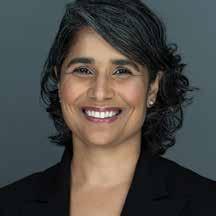
13
FEATURE
GAGNÉ
Élizabeth Gagné, BCL/LLB’02, s’est jointe à CBC/ Radio-Canada en 2017 afin d’agir comme conseillère juridique dans le cadre du projet de la nouvelle Maison Radio-Canada à Montréal. « Pour l’achat de tout le nouvel équipement technologique du bâtiment, nous avons dû négocier un total de 80 à 100 contrats avec différents fournisseurs ! », partage-t-elle. « C’était un défi des plus stimulants. » Désormais, à titre de première conseillère juridique, elle est responsable des contrats relatifs aux technologies et à l’infrastructure, aux médias numériques et à d’autres types d’approvisionnements.
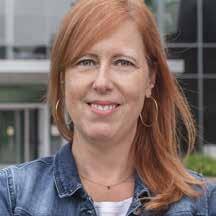
Le travail de conseiller juridique interne requiert une profonde compréhension de son organisation, soutient Me Gagné. « Comme membre du département juridique, il faut faire preuve de curiosité. Je travaille principalement avec les services d’ingénierie et de TI, donc je dois constamment poser des questions sur
le génie, la technologie et l’infrastructure. » La créativité est aussi indispensable. « Si je ne trouve pas de solutions aux obstacles qui se présentent lors de la négociation d’un contrat, les services de production pourraient se retrouver en péril. Les Jeux olympiques et les élections sont les périodes les plus exigeantes à CBC/Radio-Canada et, l’an dernier, avec deux Jeux olympiques en six mois, nous avons dû surmonter de sérieux défis de dernière minute. »
« Mes professeurs à McGill soutenaient que nous devions apprendre à penser au-delà du cadre établi. Quand je dois bâtir un contrat à partir d’une page blanche, je vois de quelle façon cette créativité entre réellement en scène », souligne-t-elle. Me Gagné a récemment terminé une négociation de vaste envergure pour l’implantation d’ un réseau interne de télécommunication. « Quand je relis ce contrat, j’y vois quelque chose qui s’apparente à une œuvre d’art », explique-t-elle. Étudiante, Me Gagné a fait le saut à la Faculté de droit directement en provenance du cégep. « Je savais combien le droit ouvrait des portes, mais j’ignorais où il me mènerait quand j’ai commencé mes études », raconte-telle. « J’ai eu l’occasion d’être avocate en entreprise tôt dans ma carrière et j’ai senti que c’était ma place. J’ai fait mon stage en cabinet privé et j’y ai vécu une excellente expérience d’apprentissage, mais je n’y éprouvais pas le même sentiment d’appartenance. » Aujourd’hui, elle s’implique comme mentore à la Faculté par l’entremise du Centre de développement professionnel, et elle encourage les membres de la communauté étudiante à considérer la possibilité d’une carrière en entreprise. « J’encourage sans hésitation les étudiantes et étudiants à faire leur stage en grand cabinet s’ils le peuvent, mais je ne veux pas qu’ils oublient que d’autres voies existent aussi. »
14 FOCUS LAW / 2022-2023 / M C GILL UNIVERSITY FEATURE
ÉLIZABETH
Jasper Meyers, BCL’83, LLB’83, senior counsel with Nokia’s Cloud & Network Services Business Group, has been based in the Netherlands (with six years in London) since he joined Allen & Overy in Amsterdam in 1988, after five years with Dentons in Toronto. The son of Dutch immigrants to Montréal, Jasper spoke the language and fit in well, appreciating the challenges of the very international practice in Amsterdam. “Many people in Canada didn’t understand my move at the time,” he recalls. When AT&T approached him in 1991 to work on M&A in central and eastern Europe, things fell into place and the opportunity to stay was too good to resist. New opportunities were opening up for lawyers following the fall of the Berlin Wall in 1989 and the 1992 Maastricht Treaty, encouraging the free movement of people, capital, goods, and services in the EU, as well as the privatization and de-regulation of industry, and the rise of the internet and cellular networks. “All business in Europe was suddenly cross-border, and multilingual lawyers, trained in both common and civil law, embracing the pluralist perspective fostered by McGill Law, had an advantage,” says Jasper, who was editor-in-chief of volume 27 of the McGill Law Journal (1981-82).
Jasper has been with the same company for 31 years, even if its name has changed: AT&T spun off Lucent Technologies in 1996, which merged with Alcatel in 2006, and Alcatel-Lucent was acquired by Nokia in 2016 (after selling its mobile phone business to Microsoft). Jasper has filled several key roles over the years, now focusing on large transactions that touch on the technological avant-garde cloud native computing, artificial intelligence, data analytics, and the metaverse.
“It’s been a white-knuckle ride,” he says. “You’re constantly trying to figure out where the technology is going and what risks it brings. It’s a creative and competitive space, and you need a global perspective to remain relevant.” The ever-evolving technology means that guidance isn’t found in law books. “You need to create new forms of contract based on the volution of software and its use cases. Curiosity, flexibility and innovation are essential.”
Jasper particularly appreciates the global span of his work. “I typically start my day speaking to Australia, China, Singapore... then Dubai and Europe, and later to the US,” he says. “I enjoy the dynamism, watching the industry evolve and contributing to developments globally.”
15
JASPER MEYERS
“
You’re constantly trying to figure out where the technology is going and what risks it brings. It’s a creative and competitive space, and you need a global perspective to remain relevant.”
PUTTING RACIST POLICING ON TRIAL
 By Maeve Haldane
By Maeve Haldane
If the state of Louisiana were a country, it’d have the highest incarceration rate in the world. Moreover, violent arrests and police misconduct incidents are commonplace, particularly in Black communities. A new initiative, Justice Lab, is tackling the state’s racially discriminatory policing. In her role as Legal Director of the ACLU of Louisiana, Nora Ahmed, BCL/LLB’12, is bringing pro bono representation to a region where it’s scant.
FOCUS LAW / 2022-2023 / M C GILL UNIVERSITY 16 FEATURE
(left) In spring 2021, ACLU Louisiana took part in a rally to protest the death of Ronald Greene, who died in the custody of Louisana State Police in 2019.
Like many in the early days of the pandemic, Ahmed was looking for meaningful change, in her case after seven years at a New York firm. A job posting at the American Civil Liberties Union of Louisiana caught her eye: it was specifically focused on racial and gender justice and sought someone who could enhance partnerships with large law firms interested in pro bono work. She was keen on social justice and change and, as a woman of colour, had personally dealt with racism. In addition, she felt well positioned for the job due to her familiarity with both big law and social issues. In her interview, she stated bluntly that her goal was to rally an army of lawyers to Louisiana.

She expected a slow transition to her new work, but within two weeks of accepting the job, George Floyd was murdered and Justice Lab was born. Outraged law firms spoke up about ensuring proper justice in underrepresented communities. Ahmed acted quickly to seize this momentum and rallied her contacts.
Plenty were looking for lockdown-friendly work. Ryan Hicks, BCL/LLB’21, associate at Freshfields Bruckhaus Deringer, says he “jumped at the opportunity to participate, because it’s the kind of work lawyers have a duty to do.” Hicks has known Ahmed since they were both English teachers in France nearly 20 years ago. “She is a force, in all the positive meanings of the word,” he says.
“It was an excellent pandemic project,” Ahmed says. “People had to imagine what a world of lawyering looked like when you couldn’t be in person.” Before long, Ahmed had an online army of hundreds, rallied from as far away as Ireland and Australia.
Ahmed, along with a paralegal and a team of more than 20 dedicated summer interns, developed a repository of guidebooks and, with the assistance of experts across the country, training videos for firms willing to take on a case. She and her executive director were acutely aware of the possible tensions of having “wealthy, largely white people in the top 1% of society engage in conversations and relationships for which many of them were likely not prepared.” Ahmed thus arranged for legal and advocacy experts to give targeted workshops on the legal system, constitutional amendment violations, and movement lawyering.
Then came the search for plaintiffs, by advertising on billboards, radio, busses, and the Internet. If someone had experienced a negative racialized interaction with police, there was a hotline to contact.
Hundreds came forward, and volunteers tackled the intake forms by interviewing plaintiffs and witnesses, as well as gathering documents. Ahmed and the team learned as they went, and tweaked the process to evaluate legal claims sooner if a claim was viable. If so, Justice Lab would proceed to an in-depth investigation and, where feasible, litigation.
Thanks to all the intakes, “we now have a good sense of where complaints are coming from across the state,” says Ahmed. The community is better informed of rights and recourses. That information was used to encourage the U.S. Department of Justice to initiate a “pattern or practice” investigation into the State’s police. Indeed, in June 2022, it did so, announcing an investigation to assess whether it uses excessive force and engages in racially discriminatory policing.
To date, Justice Lab has filed 39 cases before the courts, and is investigating 11 other complaints. “Our goal is to proceed with the litigation of 50 cases during this first phase,” Ahmed says. “We’ll reopen the intake once the docket falls to 25.”
Justice Lab is explicit about race in its litigation. It will mention the history of a neighbourhood or say if the KKK is still operational there. Ahmed is happy to find that “a handful of cases against a single police department causes them grave consternation.”
Ahmed recently won a case (now being appealed) in which officers tackled a Black woman in her driveway and threatened to tase her minor age child. Someone had accused her of driving a motorcycle without a helmet. “Even if it were true,” Ahmed says, “this wouldn’t happen to a wealthy white person. Police would go to their house, have a conversation, give them a ticket ... They wouldn’t arrest them and treat them in this way.”
Police officers’ racist, unconstitutional behaviours must be challenged, but Ahmed’s goal isn’t to play “gotcha.” The goal is to get involved in the life of a Derek Chauvin “ideally after the first complaint,” she says. “Not after someone is dead.”
17
Nora Ahmed, BCL/LLB’12
S’impliquer pour ÉPAULER LA RELÈVE
Par Karell Michaud
expérience avec Focus.
« J’ai eu la chance d’être accompagné par d’excellents mentors professionnels et universitaires lors de mes études », raconte Alain Bartleman. Ces mentors, certains formels et d’autres informels, occupent toujours une grande place dans sa vie, aujourd’hui à titre d’amis et de collègues.
Avocat pratiquant dans le domaine du droit autochtone, Alain Bartleman représente exclusivement des individus et des organisations appartenant aux Premières Nations. Il exerce principalement le droit commercial et le droit des affaires pour ses clients. Avant ses études, il a travaillé dans une pluralité d’environnements, dont un cabinet de droit parisien spécialisé en services financiers ainsi qu’une entreprise de consultation à Genève. « Je profite toujours des sages conseils et de l’expérience de mes collègues seniors. Servir comme mentor diplômé est à mes yeux une façon de perpétuer l’une des plus belles traditions du Barreau canadien. »
« Échanger avec les étudiantes et étudiants que je mentore me permet non seulement de redonner à la communauté de McGill, mais aussi de réfléchir de façon critique à ce que j’ai appris, comme étudiant et comme avocat », explique-t-il au sujet de son implication. « À un niveau fondamental, leur volonté, leur discipline et leur créativité m’inspirent à être un meilleur avocat. »
Lucie Lanctuit , BCL/LLB’10
Associée au sein du groupe de litiges et résolution de conflits chez Fasken à Montréal, Lucie Lanctuit n’a nul doute du rôle clé que peut jouer un mentor. « Il est important que les étudiants puissent avoir accès à des praticiens avec qui ils peuvent discuter du droit, tel qu’il existe au-delà des bancs de la Faculté. Cela leur permet d’avoir un échange franc dans un climat de confiance », explique-t-elle. Comme étudiante, elle aurait elle-même voulu profiter des conseils d’un mentor diplômé pour répondre aux nombreuses questions qui l’assaillaient sur les choix à faire après la diplomation, et elle espère maintenant offrir ce soutien.

Après un début de carrière en tant qu’avocate-recherchiste auprès de l’honorable Pierre J. Dalphond à la Cour d’appel du Québec, Me Lanctuit a agi comme avocate à la Commission d’enquête sur l’octroi et la gestion des contrats publics dans l’industrie de la construction (Commission Charbonneau). Avant de se joindre à Fasken, elle était associée dans un cabinet national.
Son implication lui permet en retour de demeurer au fait de la réalité de la relève. « Ces interactions me permettent de connaître les préoccupations actuelles des étudiants en droit, dont certains pourraient même devenir des collègues ou des confrères dans un avenir proche. En répondant à leurs questions, je me rappelle pourquoi j’aime tant mon métier ! »

FOCUS LAW / 2022-2023 / M C GILL UNIVERSITY 18
Alain Bartleman , BCL/LLB’16
ALUMNI COMMUNITY
À travers le programme de mentorat du Centre de développement professionnel, plusieurs membres de la communauté diplômée offrent leur temps et expertise pour soutenir la future génération de juristes. Quatre d’entre eux ont partagé leur
Lorsqu’elle a franchi les portes de la Faculté de droit pour la première fois, Kathy Nakashima n’était que la deuxième personne de sa famille étendue à poursuivre un diplôme professionnel, et il lui fallut quelque temps pour trouver ses repères. Aujourd’hui, elle aide la nouvelle génération à naviguer cette période d’incertitude. « Les études en droit peuvent être intimidantes; les mentors peuvent aider à apaiser les craintes et offrir l’encouragement nécessaire; c’est ainsi qu’on permet aux étudiants d’offrir le meilleur d’eux-mêmes », souligne-t-elle.
Présidente du conseil d’administration de la Fondation de l’Hôpital de Montréal pour enfants, Me Nakashima est une philanthrope dévouée, impliquée auprès de nombreux organismes locaux et internationaux, dont l’Université McGill, UNICEF et la Mackay Centre School. Elle a pratiqué le droit pendant neuf ans dans un cabinet spécialisé en droit commercial et droit des affaires et, à un jeune âge, elle a accédé au rôle de co-associée-directrice, devenant l’une des premières femmes à la direction d’un cabinet à Montréal. « McGill m’a permis de m’épanouir à travers ma carrière. Il me semblait naturel de maintenir des liens avec une institution qui a joué un rôle si clé dans ma vie », raconte-t-elle. Elle siège au conseil consultatif de la Faculté de droit, qui conseille le doyen sur le plan stratégique. « Comme membre du conseil, je trouve intéressant et important de voir la Faculté à travers le regard étudiant en plus du point de vue administratif. Mon implication comme mentore fait de moi une meilleure conseillère. »

« Je trouve si gratifiant de voir grandir l’implication et la confiance des personnes que je mentore », soulignet-elle au sujet de son expérience. Elle remarque que les nouvelles générations profitent davantage des activités extrascolaires. « Il est inspirant d’apprendre toutes les opportunités qui leur sont offertes, et de les voir en profiter pleinement ! », conclut-elle.
Ian Cuillerier , BCL’95, LLB’95
Bien que sa carrière l’ait mené au cœur de Manhattan, Ian Cuillerier conserve des liens étroits avec le pavillon Chancellor-Day. Associé au sein du groupe sur les produits dérivés du cabinet international White & Case, il offre depuis plusieurs années ses conseils de mentor à la communauté étudiante et soutient le Centre de développement professionnel, par exemple en offrant des présentations sur la pratique du droit à New York. « Je crois que la base du mentorat est d’offrir une nouvelle perspective et de partager des éléments de mon expérience pour aider les autres à prendre des décisions plus informées, que ce soit dans le contexte de leur carrière, de s’adapter à de nouvelles circonstances ou à trouver son équilibre », partage-t-il. « C’est un petit investissement de temps qui se traduit par un impact significatif. C’est une excellente façon de rendre au suivant. »

Il sent aussi tirer profit de l’expérience de mentor, au même titre que les personnes qu’il conseille. « Le mentorat m’offre des occasions d’autoréflexion en me poussant à m’interroger sur ce qui est et a été important pour moi », souligne-t-il. « C’est aussi un bon travail de fond, en quelque sorte : de façon pratique, cela aide à donner de la rétroaction, à perfectionner l’art de poser la bonne question et à développer ses aptitudes de leadership à un niveau très pratique et granulaire », conclut-il.
Le Programme de mentorat des diplômées et diplômés de la Faculté de droit vise à établir des ponts entre les générations présente et future de juristes. La diversité des intérêts professionnels des étudiant.e.s de la Faculté est phénoménale — votre expérience, quelle qu’elle soit, est la bienvenue. Intéressé.e à prendre part à cette expérience enrichissante et partager vos connaissances, votre cheminement personnel et votre expertise professionnelle ? Inscrivez-vous dès maintenant auprès du Centre de développement professionnel à l’aide du formulaire suivant : www.mcgill.ca/law/alumni/inspiration-network
19
Kathy Nakashima , BCL’81, LLB’81
Your source for McGill Law news, all year round

Find out what’s happening with your faculty, our students, and fellow law alumni on the web version of Focus Law / Droit !
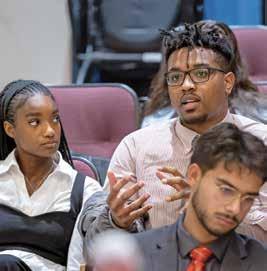
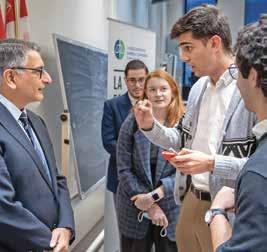
Tout au long de l’année universitaire, accédez aux dernières nouvelles de votre Faculté de droit sur notre plateforme électronique. Vous y trouverez des entrevues avec des membres d’exception de la communauté diplômée, les albums-photos de nos événements récents, les dernières nouvelles de notre corps professoral, des profils de membres de marque de la communauté étudiante, et plus encore!

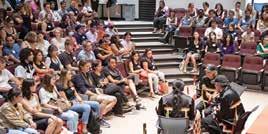
Some of our latest publications include a snapshot of our 2022 entering class, back-to-school in photos, and a Q&A with Professor Shauna Van Praagh on her recently published book Building Justice: Frank Iacobucci and the Life Cycles of Law. Also make sure to check out the photos from our 2022 Homecoming celebrations!
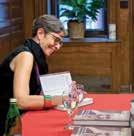
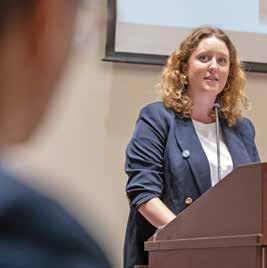
Read Focus Law / Droit at focuslaw.mcgill.ca and watch your inbox for our monthly newsletter

FOCUS LAW / 2022-2023 / M C GILL UNIVERSITY 20 4
THE BCL/JD TURNS 20
20
In 2002, a pioneering crew of graduating law students became the first in history to receive McGill Law’s integrated dual degrees in common law and civil law. Three years prior, they had embarked on the unbeaten path of McGill’s ambitiously reformed law curriculum. Today, as it celebrates its 20th anniversary, the bilingual integrated program remains innovative and is recognized as one of the best in the world.
Launched on the Faculty of Law’s sesquicentennial anniversary in 1999, the integrated program reimagined what legal education could look like in the 21st century. One of its core tenants is that students gain a deeper fundamental understanding of law through a dialogue between legal systems. From then on, all students would be learning common law and civil law concurrently, beyond the boundaries of any state’s legal system. “The goal is that, wherever they work, our graduates will be able to use the local system appropriately while understanding other ways of approaching a problem,” says Professor Shauna Van Praagh, who played a major role in the curricular reform.
La réforme est parmi les plus audacieuses à s’être tenues dans une faculté de droit dans les dernières décennies. Elle s’appuyait néanmoins sur une longue tradition d’excellence universitaire, de pluralisme juridique et de bilinguisme à la Faculté. Le droit civil et la common law cohabitaient déjà au pavillon Chancellor-Day depuis trois décennies sous le « programme national », où les deux traditions étaient enseignées séparément. Bien qu’il occupe maintenant une place centrale, le bilinguisme était requis à la Faculté dès 1875.
Two decades on, the journey has continued. Rooted in the intellectual premises of the integrated program, the curriculum has evolved to become more inclusive and interdisciplinary. Credited extracurricular opportunities (such as exchanges, moot competitions, and legal clinics) have multiplied exponentially. As a result of the initial reform process,
reflecting on how law is taught has become deeply ingrained in the McGill Law culture. A new faculty-wide consultation was launched on the 10th anniversary of the program and led to the 2016 curriculum renewal, notably making a greater place for experiential learning. Focus Week workshops were introduced, bringing in seasoned practitioners to teach intensive courses on matters relevant to current practice. In the past decade, the Faculty has acted on its commitments to making a greater place for Indigenous legal traditions in the integrated curriculum. The launch of a mandatory first-year course on this topic in 2021 marked a milestone in this pursuit.
Partout autour du monde, le grade BCL/JD est devenu un gage d’excellence. En 2022, le Times Higher Education a prononcé McGill le 17e meilleur endroit au monde où étudier le droit. Chaque année, les diplômées et diplômés de la Faculté raflent un nombre significatif de sièges parmi les convoités postes d’auxiliaires juridiques à la Cour suprême du Canada. Que ce soit à titre de praticiens solos, associés dans des grands cabinets, entrepreneurs ou figures publiques, les membres de la communauté diplômée poursuivent des carrières exceptionnelles dans des juridictions partout sur la planète.
« On me confie régulièrement que les juristes formés à McGill se distinguent par leur créativité, leurs aptitudes critiques et leur polyvalence exceptionnelle », souligne le doyen Robert Leckey « C’est avec une grande fierté que nous formons les leaders juridiques qui transformeront le monde de demain. »
21
AU LANCEMENT
Enseigner et penser le droit, au-delà des frontières d’une seule tradition juridique
Approche intégrée
Le droit civil et la common law sont enseignés concurremment dans certains domaines clés. L’approche intégrée inspire de nombreux autres cours.
Programme bilingue Tous les cours obligatoires requièrent des lectures en français et en anglais, peu importe la langue d’enseignement.
Double diplômation
Deux diplômes, en droit civil et common law, reçus simultanément à l’issue du programme.
THE INTEGRATED BCL/JD PROGRAM, THEN AND NOW
1994 Start of the five-year Faculty consultation on ‘What should legal education at McGill look
the
century?’ 1999 Lancement du « programme de McGill », combinant les cursus de droit civil et de common law selon une nouvelle approche intégrée ou « transsystémique » 2012 A decade after the graduation of the integrated program’s first cohort, a community-wide reflection is launched on how it has fared, and where to go next. FOUNDATIONAL COURSES ADVANCED COURSES AND ELECTIVES EXPERIENTIAL LEARNING (e.g. McGill Law Journal, Legal Information Clinic, moot competitions, human rights internships) INTEGRATED COURSES Contractual Obligations, Extra-Contractual Obligations TRADITION-SPECIFIC PRIVATE LAW Civil Law Property FIRST-YEAR MANDATORY COURSES Foundations, Constitutional Law PUBLIC LAW Criminal Law, Admin Law, Public Int’l Law TRADITION-SPECIFIC PRIVATE LAW Common Law Property, Advanced Obligations in each tradition OTHER ADVANCED CLASSES Many classes informed by the integrated approach (e.g. Evidence, Civil Procedure) YEAR 2-4 L YEAR 1 L THE BCL/JD TURNS 20 FOCUS LAW / 2022-2023 / M C GILL UNIVERSITY 22
like at
end of the 20 th
Two decades after the graduation of its first cohort, we look at how the integrated program has evolved over the years, maintaining itself as a global model for legal education.
STRUCTURE ACTUELLE
Une formation fondamentale renforcée par l’expérience pratique
Approche intégrée élargie L’approche intégrée permet d’accorder une place grandissante aux traditions juridiques autochtones, aux traditions juridiques du reste du monde et aux perspectives interdisciplinaires.
Acquisition de compétences pratiques
En complément à sa formation fondamentale, le programme offre plusieurs occasions d’apprentissage par la pratique et la résolution de problèmes, dispensées par des juristes d’expérience.
RENEWED MANDATORY CLASSES
Criminal Justice, Indigenous Legal Traditions
RENEWED MANDATORY CLASSES
Integrated Property Law Legal Ethics and Professionalism, Advocacy
• Nouvelles expériences d’apprentissage par la pratique et par la résolution de problèmes (semaine d’intégration, Focus week )
• Nouveaux cours intégrés (Criminal Justice, Integrated [or “Transsystemic”] Property Law)
• Place grandissante aux traditions juridiques autochtones dans le cursus intégré
Réputation mondiale
Les membres de la communauté BCL/JD sont reconnus pour leur polyvalence exceptionnelle, leur permettant de poursuivre des carrières épanouies partout au monde.
INTEGRATION WEEK + WORKSHOPS
Introductory workshops in small groups + plenary lectures
FOCUS WEEK WORKSHOPS
Intensive workshops with seasoned practitioners on topics relevant to current practice
EXPERIENTIAL LEARNING
Expanded opportunities of credited extracurricular activities for students of all years, including new journals, and an increased offering of legal clinics, exchanges, moot competitions, and more.
2019
Following the new North American standard, McGill Law adopts the JD designation for its common law degree.
2021
Ajout d’un cours obligatoire de première année sur les traditions juridiques autochtones.
FOUNDATIONS OF THE
PROGRAM
INTEGRATED
1999
2016
23
Renouveau du programme BCL/LLB :
LE PROGRAMME INTÉGRÉ, DANS LEURS MOTS
À l’occasion des vingt ans du programme intégré, trois membres de sa cohorte inaugurale partagent de quelle façon ce dernier a joué un rôle dans leurs carrières accomplies.
“McGill Law broadened my horizons on many levels and helped me appreciate different perspectives in both law and in life. I was born and raised in Edmonton and returned to practice law there with a greater ability to serve clients from various cultures, backgrounds, and experiences. I often reflect on how fortunate I am to be able to draw on my legal education to help resolve issues.”
THE HON. ANNA LOPARCO, BCL/LLB’02, MBA’03
The Hon. Anna Loparco was appointed to the Court of King’s Bench of Alberta in 2019. She was previously a partner at Dentons (formerly Fraser Milner Casgrain LLP), where she had practiced civil litigation for 15 years. As chair of the Court’s Restorative Justice Committee, she played a central role in launching the Honourable Beverley Browne Wîyasôw Iskweêw Restorative Justice Committee Pilot Project. In 2022, she endowed the Anna Loparco Entrance Scholarship at McGill, an academic achievement award to support Indigenous students from the Prairie provinces entering the BCL/JD program.


“Studying law at McGill was one of the best decisions I ever made. In legal practice, whether in Canada or the Netherlands, Tanzania, or Sierra Leone, or now in academia in the USA, McGill’s comparative law training was the legal toolbox that enabled me to step back and analyze problems in a more complex and more creative way.”
PROFESSOR CHARLES C. JALLOH, BCL/LLB’02

Dr. Charles C. Jalloh is Distinguished University Professor at Florida International University. He is a member of the United Nations International Law Commission and chaired its Drafting Committee in 2018. In 2022, he was appointed a Special Rapporteur for the topic Subsidiary means for the determination of rules of international law. The founding editor of the African Journal of Legal Studies and the African Journal of International Criminal Justice , he is a member of the Board of Editors of the American Journal of International Law and the Founder of the Center for International Law and Policy in Africa.
“My McGill legal education empowered me to draw on foundational first principles, multiple sources, and different legal tools to craft sound arguments and solutions in those grey zones where no obvious answer exists. The McGill program has not only made me a better and more creative lawyer, it has also helped keep me engaged and passionate about my work in law.”
MEGAN STEPHENS, BCL/ LLB’02, 2002 recipient of the Aimé Geoffrion Medal
Megan Stephens runs her own law firm where she specializes in constitutional and criminal litigation. She regularly represents complainants in sexual assault proceedings and has a long-standing interest in improving the justice system’s responsiveness to gender-based violence and related concerns about the criminalization of women.
FOCUS LAW / 2022-2023 / M C GILL UNIVERSITY 24 THE BCL/JD TURNS 20
70 YEARS OF EXCELLENCE IN AIR AND SPACE LAW
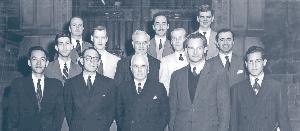

The Institute of Air and Space Law (IASL) at McGill University is the world’s premier graduate educational research institution in the fields of air and space law. In the decades since its founding in 1951, the IASL’s rich offering of courses and outstanding staff and expertise have paved the way for over 1,200 graduates to fill some of the most eminent positions in the aviation and space industries, in the legal profession, at academic and governmental institutions as well as in international organizations around the world. In 2021, the IASL marked its seventieth anniversary by celebrating a long and rich history dedicated to excellence in graduate legal education, public service, and scholarship. As the domains of aviation and outer space activities continue to grow and expand, the IASL looks forward to building on the efforts of its staff and alumni over the years to excel long into the future.

25 25 FACULTY NEWS
AND NOTABLE
ALUMNI THROUGHOUT THE
AT:
DISCOVER THE HISTORY OF THE IASL, ITS MISSION AND EDUCATIONAL PROGRAMS,
FACULTY AND
YEARS
MCGILL.CA/ IASL
The IASL Faculty and students in 1951 The IASL entering class of 2022-2023
The Frederick Phillips Summer Program
 By Aminata Mboup & Karell Michaud Photos by Dee M’Bow
By Aminata Mboup & Karell Michaud Photos by Dee M’Bow
In July, the Faculty of Law welcomed twenty-one high school seniors and CEGEP students. Over a two-week full-time program, they worked on a personal project, took part in workshops with seasoned law practitioners, and went on field trips to law firms and Montreal courts. Hired as the Faculty of Law’s Black student coordinators, OMMU-KULSOOM J. ABDUL-RAHMAN and CHLOE KEMENI designed and spearheaded this initiative, in consultation with the Black Law Students’ Association of McGill. Funding was provided by the Office of the Provost and Vice-Principal (Academic), under the auspices of McGill’s Action Plan to Address Anti-Black Racism. They shared their experiences with us.
How was the idea for the program born?
Ommu-Kulsoom: When I worked in a student recruitment role at McGill, I heard of an American school that ran summer programs for different identity groups like Black African Americans, Latinx Americans, and Indigenous students. Their goal was to give them a chance to see themselves pursuing higher education and show how they would be included and accepted within their space. I found that meaningful.

After starting at the Faculty and seeing the new commitments the University had made to Black students, I made a first draft of the program and contacted Chloe to share the idea. [In a meeting with the Black Law Students’ Association of McGill,] we presented the project to Dean Leckey and to Brittany Williams, who was acting assistant dean (admissions) at the time. They liked the idea and approved us running a pilot.
What were your intentions and goals for this program stepping into this?
Ommu-Kulsoom: The vision was to create a pathway to higher education in law school that was much more inclusive and mindful of the youth and their background. We wanted to make this an environment where they would feel comfortable and thrive in.
For Black students, McGill can seem very isolating since it is a predominantly white institution. We wanted to show them that it was a space where they could build community. There is strength in the way Black students at McGill congregate and support each other. We wanted to give program participants a taste of it, so they could see themselves applying to McGill and pursuing this as an option, rather than feel it is less attainable than other schools.
FOCUS LAW / 2022-2023 / M C GILL UNIVERSITY NOUVELLES DE LA FACULTÉ 26
Ommu-Kulsoom J. Abdul-Rahman and Chloe Kemeni wanted to demystify for Black teenagers what it takes to pursue a legal education. So they invited them to experience it for themselves.
A law firm visit allowed program participants to picture what a law career would look like, beyond the classroom.

How did the selection process happen?
Ommu-Kulsoom: Kimberley Lee-Louis [then assistant dean (inclusion – Black and Indigenous flourishing)] was able to help us get the word out and promote it. She was a great sounding board, because she was familiar with the youth we were trying to target. We were mindful of ensuring that the students we recruited were representative of various backgrounds. Some of us have more access to certain opportunities than others and are more affluent, coming from privileged backgrounds. In that sense, we wanted to make sure that a variety of youth were being led into this program as well.
Chloe: A lot of students were saying that it was through word of mouth that they were able to get information, from their parents or from teachers for instance. So now that the students have gone through it and had a positive experience, if another edition of the program were held, I can imagine that we would have even more applicants.
What were the highlights of the program for you?
Chloe: I think for me it was at the gala. We saw two students taking pictures together and, when I asked if they knew each other before, they replied that they had just met during the program. I am proud of many things we did, but seeing those friendships build over time was priceless. Some folks who did not even know each other were carpooling in together from the second or third day! I think it’s beautiful and essential to be able to say that you have built friendships from this. And if they both want to get into a program down the line, they now have someone they can rely on. The community is so small it’s quite easy to end up walking through most stages of the law experience together. It’s always nice to have those support systems.
Frederick R. Phillips, BCL’56, was the first Black lawyer to be admitted to the Quebec Bar. As a veteran returning from three years in the Air Force, he completed his entire high school diploma in one year, then pursued a BA and finally a BCL at McGill. He practiced law for 36 years and was a trailblazer for generations of Black lawyers who followed and continued to face barriers in the legal profession.
Ommu-Kulsoom: Another highlight was when elders in our community would come up to us and speak about how meaningful the program was to them. They felt that if they had this opportunity when they were younger, their path could have been different. Back in their days, programs like these were not an option, so they ended up in a career path more closely aligned to what a Black person was expected to do at the time. Their comments made us realize how meaningful the program was, not only to the students, but to older folks in our community who saw its value and who took it upon themselves to get the word out so their children or grandchildren could apply.

27
Deux survivantes de la purge LGBTQ des Forces armées canadiennes honorées à la Faculté
Photos par Owen Egan / Joni Dufour
Pour l’inauguration d’événements nommés en leur honneur, la Faculté de droit a accueilli Michelle Douglas et Martine Roy, deux activistes ayant porté devant les tribunaux les mesures discriminatoires anti-LGBTQ perpétuées par le gouvernement canadien pendant quatre décennies.
CONFÉRENCE MICHELLE DOUGLAS
Le 15 mars, Michelle Douglas (1) a offert l’édition inaugurale de la conférence baptisée en son honneur. Elle a raconté comment, en 1989, elle a été congédiée des Forces armées canadiennes en raison de son orientation sexuelle, malgré un fulgurant début de carrière. La poursuite pour discrimination qu’elle a intentée contre le gouvernement a mené à l’abolition en 1992 des mesures discriminatoires anti-LGBTQ en place dans l’appareil fédéral depuis les débuts de la Guerre froide.
« One of the greatest privileges of being an advocate is being entrusted with telling someone’s story through legal action [ ] it’s the heroes of these stories who, through their pain, sacrifice and courage, change things for everyone”, said Mtre Audrey Boctor, BCL’05, LLB’05, (2) as she introduced Michelle Douglas. Mtre Boctor served as lead counsel to the Quebec class members in the 2016 LGBT Purge class action lawsuit against the Canadian government.
“[Michelle Douglas] had to fight because people failed to do the right thing,” concluded the Hon. Alexander Pless, BCL’98, LLB’98, (3) Quebec Superior Court judge and adjunct professor, highlighting that at the time of her dismissal from the army, more than twenty years had passed since Prime Minister Trudeau had declared that the State did not have its place in the bedrooms of the nation.
COLLOQUE ÉTUDIANT MARTINE ROY
À l’occasion de la première édition du colloque étudiant Martine Roy, tenu le 15 mars, quatre membres de la communauté étudiante ont offert des présentations sur le thème « Vers l’égalité et la justice pour les personnes LGBTI ». Organisé par le Centre sur les droits de la personne et le pluralisme juridique (CDPPJ), le colloque rend hommage à Martine Roy (4), une ardente défenseuse de la justice pour les communautés LGBTQ qui a été congédiée des Forces armées canadiennes en 1984 en raison de son orientation sexuelle. En 2016, lorsque les survivant.e.s de la Purge intentèrent un recours collectif contre le gouvernement fédéral, Martine Roy fut l’une des représentantes du groupe. Ce recours a mené en 2018 à des excuses officielles du Canada, accompagnées d’un dédommagement de 145 millions de dollars pour les survivant.e.s.
La candidate au BCL/JD Andie Hoàng-Lefranc (5) a remporté le prix Martine Roy pour son essai intitulé : « Family is a Drag : Extra-Legal Formations of the White-Picket Dream ».
« As an aspiring academic, it’s encouraging to know that my work is deserving of recognition » a-t-elle déclaré. « I’m so grateful for everyone who has helped me get to this point and I hope to continue to advocate in ways that live up to the efforts of Martine Roy and Michelle Douglas ».
FOCUS LAW / 2022-2023 / M C GILL UNIVERSITY 28 ALUMNI COMMUNITY
Le colloque étudiant Martine Roy et la conférence Michelle Douglas se veulent un espace pour faire progresser l’égalité et l’accès à la justice pour les communautés LGBTQ à travers la recherche et l’engagement étudiant. Ces événements se tiendront aux deux ans à la Faculté de droit grâce au soutien permanent permis par un généreux don d’IMK Avocats, qui était l’un des cabinets de droit représentant les survivant.e.s de la purge LGBTQ lors de leur recours collectif contre le Gouvernement du Canada.

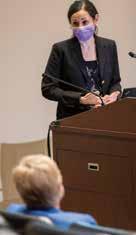
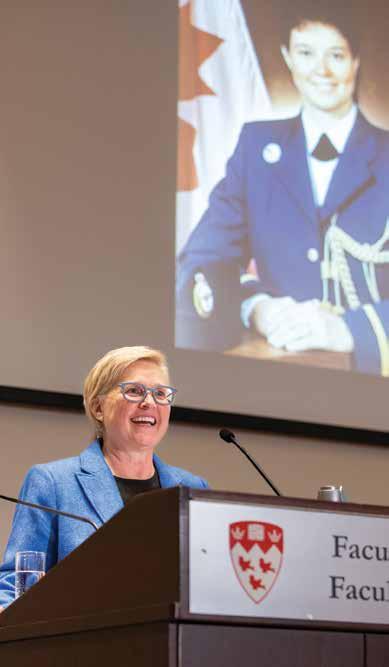
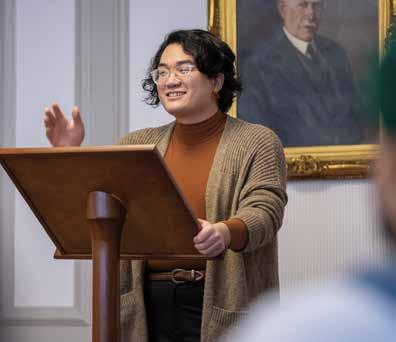
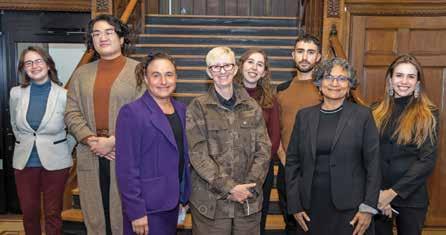
29 5 4 2 3 1
Can solitary confinement be reformed or abolished in Canada?
 By Karell Michaud Photos by Owen Egan / Joni Dufour
By Karell Michaud Photos by Owen Egan / Joni Dufour
Data presented at the 2022 Michel Proulx roundtable painted a bleak picture of what goes on behind the walls of Canadian penitentiaries
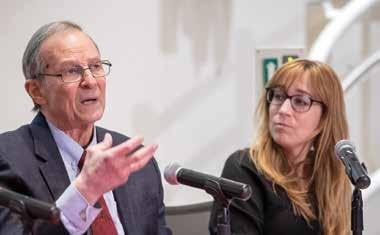
“If a society can recognize that even someone guilty of a serious crime possesses inalienable constitutional and human rights, that is a sign of its commitment to human dignity,” said Professor Mugambi Jouet in the introduction of the 2022 Michel Proulx roundtable.
This year’s roundtable was centered around Canada’s recent attempt to reform solitary confinement. To tackle this timely subject, Jouet welcomed two of the country’s foremost experts on the matter: Professor Emeritus Anthony Doob of University of Toronto, and Professor Jane Sprott of Toronto Metropolitan University. Eminent criminologists, they have released three critical reports on Canada’s new administrative segregation regime which have garnered national attention.
In 2019, Bill C-83 was introduced and became law in Canada. It was hailed by the federal government as putting an end to solitary confinement. The new law replaced administrative and disciplinary segregation with “structured intervention units” (SIU) that would notably provide inmates at least four hours a day outside their cells, regular human contact, and external assessors for prolonged SIU stays.
After having analyzed the utilization data of these new SIU, Doob and Sprott shared a troubling account of the reform’s rollout. The United Nations Nelson Mandela Rules on Prisoners’ Rights define solitary confinement as restricting a prisoner to their cell for twenty-two hours per day or more. Sixteen days or more of such detention is defined as torture, or other cruel and inhumane punishment. Following these definitions, 28% of the SIU stays Doob and Sprott studied met the UN’s definition of “solitary.” 9% fit the definition of “torture”.
FOCUS LAW / 2022-2023 / M C GILL UNIVERSITY 30
NOUVELLES DE LA FACULTÉ
“We need to open up prisons so people actually understand what’s happening at an operational level,” Doob stressed. He had chaired the advisory panel responsible for overseeing Correctional Services Canada’s (CSC) implementation of the Bill C-83 reform, and recounted dealing with an opaque institution unwilling to submit to external oversight. Over the year it was in activity, the panel had been unable to obtain any SIU data from CSC. The advisory panel disbanded and released a damning final report recounting their inability to carry out their mandate due to CSC’s lack of cooperation, which was picked up by the media and pressured the then Public Safety Minister Bill Blair into intervening. Numbers came just a few weeks later. The panel’s experience, Sprott highlighted, showed how crucial strong political leadership would be in achieving effective reform; a dire perspective given the lack of voter appeal, she deplored.
“Remember that the vast majority of [people in prisons] will be released one day,” Sprott concluded.
“It’s in no one’s interest to have them go from these

Watch the 2022 Michel Proulx Roundtable on Criminal Law: mcgill.ca/x/3gh

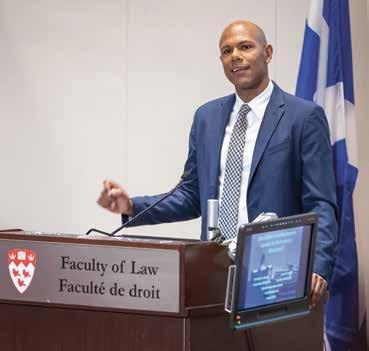
31
The Honourable ALISON HARVISON YOUNG, BC’83, LLB’83, a judge of the Ontario Superior Court of Justice, was appointed to the Court of Appeal for Ontario. Justice Harvison Young was a member of the Faculty of Law of McGill University from 1988-1998, teaching in the areas of public, private and family law.
sorts of environments to our streets.”
The Hon. Michel Proulx (1939-2007) devoted his life to the improvement of the criminal justice system and to the advancement of human rights in Canada. Called to the Quebec Bar in 1963, he became known as one of the finest criminal lawyers nationwide. In 1989, he was appointed to the Court of Appeal of Quebec. Michel Proulx taught Criminal Procedure and Evidence in Criminal Matters for over twenty years as an adjunct professor at the Faculty of Law. The Michel Proulx Roundtable Conferences in Criminal Law are hosted annually to honour his memory, and the McGill community is grateful to the Proulx family for making this event possible.
Professor Mugambi Jouet
(left) Guest speakers Professor Emeritus Anthony Doob and Professor Jane Sprott
Retour resplendissant de la cérémonie de collation des grades
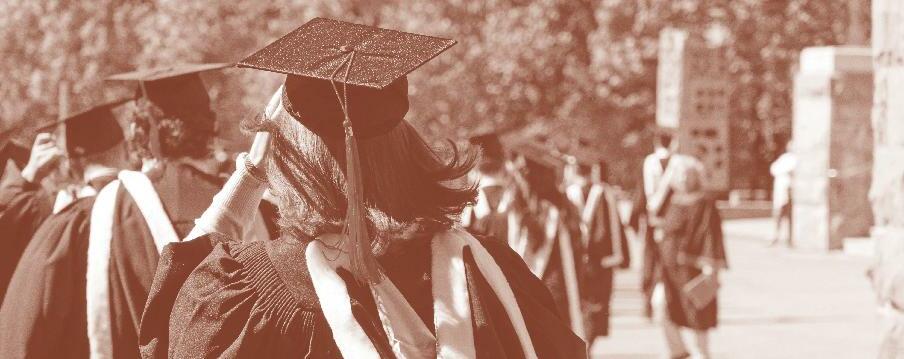
Après un hiatus de deux ans, le chant de la cornemuse a de nouveau retenti sur le campus de McGill.
La reprise des activités en présentiel à l’Université a permis la célébration en grande pompe de deux cérémonies de collation des grades : celle pour la promotion de 2022, ainsi qu’une cérémonie reportée pour les promotions de 2020 et 2021, qui à l’époque avaient dû se contenter d’une collation des grades virtuelle en raison de la pandémie.
Tant sur l’estrade que dans les rangs de l’audience, la joie et l’enthousiasme étaient palpables sous la grande tente. L’appel de chaque nom a été nourri de généreux applaudissements et acclamations.
C’est Béatrice Courchesne-Mackie, BCL/JD’22, ancienne présidente de l’Association des étudiant.e.s en droit, qui a été élue majore de promotion. « The connections we have made, the jokes we have shared, and the calf strength we have built by walking uphill will not be lost on us. Si nous restons fidèles aux valeurs qui ont marqué notre cohorte, comme la compassion et la communauté, le succès sera inévitable », a-t-elle assuré à ses collègues.
La professeure Johanne Poirier, récipiendaire du prix Durnford
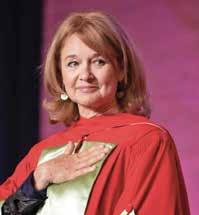
« La professeure Johanne Poirier brille autant dans la salle de classe que sur la scène internationale », a souligné Daniel Boyer, Ad E, bibliothécaire en chef nouvellement à la retraite, en présentant la récipiendaire du prix d’excellence en enseignement John W. Durnford 2022. Il s’agit de la deuxième fois que la communauté étudiante lui décerne ce prix, qui souligne la pédagogie exceptionnelle d’un membre du corps professoral.
James (Sa’ke’j) Youngblood Henderson, MSRC, LLD’22, une autorité mondialement reconnue en savoirs, héritage et jurisprudence autochtones, a reçu un doctorat honorifique et offert le discours d’envoi à la nouvelle cohorte. Il a exhorté les finissantes et finissants à repousser les limites du possible et à aspirer à créer le changement qu’ils veulent voir au sein de leur communauté. « In a life of law, you will have hesitancies, setbacks, and triumphs, but a life of law is a high responsibility, and an amazing journey into a future which we all hope will be better », a-t-il confié.
Pour conclure, le doyen Robert Leckey, Ad E, a exprimé son estime envers une cohorte qui, en surcroît aux défis intrinsèques des études en droit, avaient eu à s’adapter et persévérer durant les nombreux changements entraînés par la pandémie. « Dans notre grande faculté, vous avez étudié et vécu le droit d’une manière unique. Vous nous quittez habileté.e.s à penser le droit différemment des diplômé.e.s d’ailleurs – votre imagination ayant été stimulée par la sagesse de plus d’une tradition juridique », a-t-il souligné. « Vous avez donc plusieurs cordes à votre arc qui vous permettront de briller dans des conditions incertaines et fluctuantes. »
Visionner la cérémonie de collation des grades de la promotion 2022 : https://mcgill.ca/x/3GB
Visionner la cérémonie de reprise pour les promotions 2020 et 2021 : https://mcgill.ca/x/3G2
Lire le discours d’envoi du doyen Robert Leckey : https://mcgill.ca/x/3G6
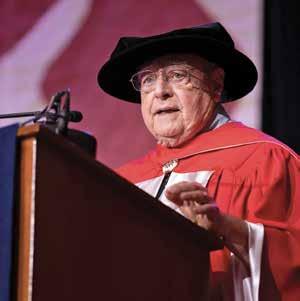
FOCUS LAW / 2022-2023 / M C GILL UNIVERSITY 32 ALUMNI COMMUNITY
James (Sa’ke’j) Youngblood Henderson, MSRC, LLD’22
Photos par Owen Egan / Joni Dufour
Réception festive au Faculty Club
Photos par Paul Fournier
Après la cérémonie de collation des grades, la Faculté de droit a accueilli les membres de la promotion de 2022 et leurs proches dans le somptueux bâtiment centenaire du Cercle universitaire de McGill (Faculty Club) afin de célébrer le nouveau chapitre qui s’ouvre devant eux.
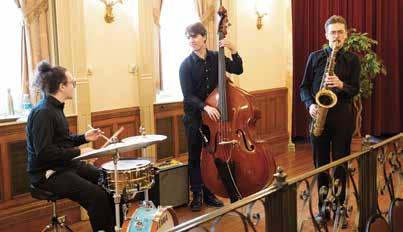
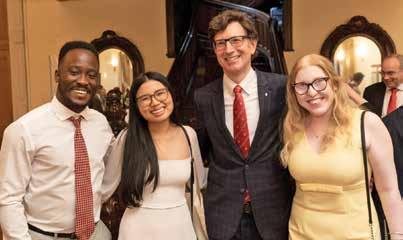
(en haut) Me John Lennard, BCL/LLB’11, membre du Comité consultatif de la Faculté et associé chez Stikeman Elliott, a félicité la nouvelle cohorte, en l’encourageant à prendre part à la vibrante communauté diplômée de la Faculté de droit.
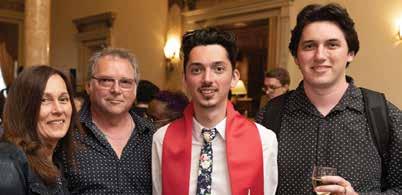
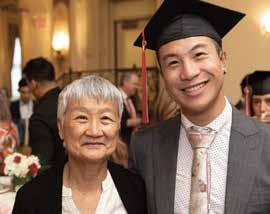
Jemark Earle, BCL/JD’22; Kim-Lan Dam, BCL/JD’22; le doyen Robert Leckey, Ad E, hôte de la réception; et la majore de promotion Béatrice Courchesne-Mackie, BCL/JD’22.
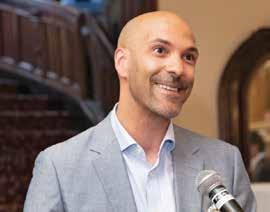 (en haut) Poursuivant une tradition chère à la Faculté de droit, cette réception a marqué sur une note joyeuse l’entrée de la nouvelle cohorte dans la communauté internationale des diplômé.e.s en droit de McGill.
(en haut) Poursuivant une tradition chère à la Faculté de droit, cette réception a marqué sur une note joyeuse l’entrée de la nouvelle cohorte dans la communauté internationale des diplômé.e.s en droit de McGill.
33
(en haut) David How, BCL/JD’22, et sa mère Angela . (à droite) Sayre Potter, BCL/JD’22, et ses invités.
Outstanding alumni honoured by the McGill Alumni Association

Spring 2022 marked the in-person comeback of the McGill Alumni Association’s Honours and Awards banquet, a celebration of distinguished members of the McGill community. Each year, the MAA recognizes those who have made standout contributions and achievements in service of the University, alumni life, and their respective communities. The Faculty of Law proudly presents those who were celebrated in person this year — and those who had a more subdued virtual presentation in 2021.
Annamaria Enenajor , BCL/LLB’12 2021 JAMES G. WRIGHT AWARD

Anthony “Tony” Fata , BCL/LLB’90 2021 E. P.
TAYLOR AWARD
Tony Fata often says that his McGill law degrees gave him the tools to understand the world and that, in turn, he gives back to McGill through his energetic support for and involvement in his alma mater. He leads by example, whether by spearheading VIP salon breakfasts to re-engage alumni or by contributing to his graduating class 10th anniversary project and the Daniel Jutras International Graduate Student Award. He and his wife created the Teresa and Tony Fata Fund for Innovation in Teaching and Learning in the Faculty of Law. In 2016, he joined the Faculty Advisory Board, becoming its chair in 2020.
With a passion for social justice, a dedication to excellence in her work, and a resolute focus on confronting systemic racism, Annamaria Enenajor embodies the best qualities of McGill’s young alumni. After graduating, she clerked at the Supreme Court of Canada, devoted many hours to pro bono practice in civil rights cases, and joined the law firm where she is now a name partner, Ruby Shiller Enenajor DiGiuseppe, Barristers, focusing on criminal and constitutional law. As executive director of the Campaign for Cannabis Amnesty, she is a leading advocate for the half-million Canadians who carry a criminal record for simple possession of the drug.
34
FOCUS LAW / 2022-2023 / M C GILL UNIVERSITY
ALUMNI COMMUNITY
Khadija Ahmed ,
BCL/JD
Candidate 2021 CHANCELLOR GRETTA CHAMBERS STUDENT LEADERSHIP AWARD
Since beginning her studies at the Faculty of Law, Khadija Ahmed has been an exceptionally active student, notably serving as co-president of the McGill Muslim Law Students’ Association. She has been involved, among others, in the Women of Colour Collective, the Legal Information Clinic, the McGill Law Journal, and the executive of the McGill Law Students’ Association. She contributed to organizing a march against Quebec’s Bill 21 and spoke eloquently to local media on behalf of the McGill Muslim Law Students’ Association. She has demonstrated a remarkable commitment to fostering the inclusion of Muslims within Quebec and Canadian society, and to working with others to build bridges and understanding.
 H. Waxman , BA’86, LLB’91, BCL’92 2022 E. P. TAYLOR
H. Waxman , BA’86, LLB’91, BCL’92 2022 E. P. TAYLOR

AWARD
After a 14-hour swim across the English Channel part of his journey to becoming the first Canadian man to complete the Triple Crown of Open Water Swimming Jordan Waxman proudly held up the McGill flag on the shoreline in France. Holder of three McGill degrees, he is wonderfully supportive of his alma mater. Jordan is president of The Friends of McGill University, Inc., in the United States, a director on the Regional Advisory Board US (East Coast), and a member of the Faculty Advisory Board. His extensive philanthropic support includes funding the Scarlet Key Society’s pinning ceremony each year and underwriting the Faculty’s events in New York City.
Amélia Souffrant , BCL/JD Candidate
2022
CHANCELLOR GRETTA CHAMBERS STUDENT LEADERSHIP AWARD
A co-president of the Black Law Students’ Association of McGill during 2021-22, Amélia Souffrant is a collaborative leader working to improve life for others. Her family circumstances and her experience as a Black woman have inspired her to pursue a career addressing issues of systemic discrimination in the justice system. In 2019, she was selected by the Institut du Nouveau Monde to write an opinion shared with Quebec’s Ministère de l’Immigration, de la Francisation et de l’Intégration on a project exploring challenges and innovative approaches to living in community. Black Girls Gather, a book club she co-founded in 2021, uses Black literature as a point of departure for discussions on race and identity, and won a Forces AVENIR award for shaping engaged and community-oriented citizens. In spring 2022, she received a Scarlet Key.

Florence Ashley , BCL/LLB’17, LLM’20 2022 JAMES G. WRIGHT AWARD
A doctoral candidate at the University of Toronto’s Faculty of Law who has clerked at the Supreme Court of Canada, Florence Ashley is a brilliant young scholar with an extensive publication record. They are committed to serving and sharing knowledge within their communities the transgender community, as well as the medical/ bioethical and legal communities. Their advocacy is broad and includes linguistic issues, medical ethics, research ethics, and the legality of so-called conversion therapy including serving as an expert witness in special consultations and public hearings on Bill 70. In 2022, UBC Press published a monograph developed from their master’s thesis, Banning Transgender Conversion Practices: A Legal and Policy Analysis

35
Jordan
Izak Almaleh, LLB’86, BCL’86
Thomas Bernier-Villeneuve, BCL/LLB’19
Ben Bierbrier, QC, BCL’67
Leonard H. Bierbrier, BCL’68
Brahm B. L. Campbell, BCL’61
Carol Delisle, LLB’91, BCL’91
William Mark Dresser, BCL’85, LLB’85
Andre F. Durso, BCL’60
William N. Gagnon, BCL’57
Louis B. Gascon, BCL’70
A. Jean de Grandpré, BCL’43, LLD’81
Colin A. Gravenor, BCL’67
Saul Handelman, BCL’61
Pierre M. Hébert, BCL’69
Richard André Hinse, BCL’74
A. Stuart Hyndman, QC, BCL’52
The Hon. Donald James Johnston, BCL’58, LLD’03
Mitchell H. Klein, BCL’60
Denyse Richer La Fleche, BCL’53
Yolande Landry, BCL’77
David B. Leibson, BCL’70, LLB’71
John Brian MacFarlane, LLB’90, BCL’90
Kathryn Harris Mason, BCL’54
Michael S. Mather, BCL’59
David Clark McPhillips, LLB’74
Stuart Millowitz, BCL’60
Jean-Norbert Ouellette, BCL’79
The Hon. Deborah Jeannine Paquette, LB’81
Bernard Gordon Pennee, BCL’74, LLB’75
The Hon. Eva Marie Petras, LLB’80, BCL’80
Marvin P. Rosenhek, BCL’53
Bernard Rubenstein, BCL’50
Gary L. Ruby, BCL’73
Victor Edwin Rudinskas, BCL’77, LLB’77
Anthony W. Ryan, LLB’72
Tom Schneider, LLB’89, BCL’89
Neil D. Shee, BCL’62
John J. Swidler, BCL’69
Allan S. Tanny, BCL’73
Robert C. Wetenhall, LLD’12
Harvey W. Yarosky, BCL’61
Stephen A. Smith 1958-2022
The Honourable ALISON HARVISON YOUNG, BC’83, LLB’83, a judge of the Ontario Superior Court of Justice, was appointed to the Court of Appeal for Ontario. Justice Harvison Young was a member of the Faculty of Law of McGill University from 1988-1998, teaching in the areas of public, private and family law.
Stephen A. Smith joined the Faculty of Law as an associate professor in 1998, being promoted to full professor in 2004 and named a James McGill Professor in 2009. His doctoral studies at Balliol College, University of Oxford, had followed a BA in political science from Queen’s University and an LLB from the University of Toronto. In 1989, he clerked for Chief Justice Brian Dickson of the Supreme Court of Canada.
A prolific and respected scholar, he is the author of Contract Theory (2004), Atiyah’s Introduction to the Law of Contract, 6th ed (2005), Rights, Wrongs, and Injustices: The Structure of Remedial Law (2019), and many articles and chapters. His scholarly contributions were recognized by a Killam Fellowship from the Canada Council for the Arts (2008), appointment as a New Zealand Law Foundation Distinguished Fellow (2017), and his election as a fellow of the Royal Society of Canada (2020).
Trained in the common law, Professor Smith embraced the learning of the civil law and became a respected professor of Contractual Obligations and Extra-contractual Obligations (Torts), foundational courses in our integrated, double-degree program.
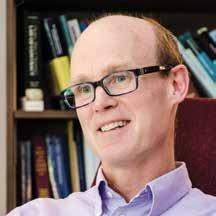
It is proof of his curiosity and commitment to lifelong learning that, as a renowned scholar of contracts, he should exchange the main course in his doctrinal area for Torts for the sheer joy of the new challenge.
Kind, gentle, thoughtful, and unassuming, Professor Smith was a wise and deeply collegial citizen of the Faculty of Law and the university. He spoke directly and honestly, exuding what one colleague characterized as his “trademark quiet confidence.”
He served as associate dean (graduate studies and research) from 1999–2001 and chaired the Faculty of Law’s Space Committee for many years, overseeing the planning and execution of renovations to New Chancellor Day Hall’s first, third, fifth, and sixth floors.
Several colleagues took Professor Smith as exemplary in living and enjoying a balanced life, one marked by curiosity and intense engagement. He read fiction and nonfiction constantly. He loved good food and cooking. He had a wonderful sense of humour. He was kind in everyday interactions and intellectual ones, framing his disagreements constructively in challenging conversations that he relished.
Professor Smith cherished his colleagues and they cherished him.
Our thoughts are with his family, and all who knew and loved him, as we did.
Robert Leckey, Ad. E. Dean and Samuel Gale Professor of Law
FOCUS LAW / 2022-2023 / M C GILL UNIVERSITY 36 In Memoriam
60’s and 70’s
Stephen Cheasley, BCL’62, was elected president of the Canadian Railroad Historical Association Foundation, which supports Exporail, the Canadian Railway Museum in Delson−SaintConstant, Quebec.
Joel King, BCL’71, LLB’72, received the Sovereign’s Medal for Volunteers in recognition of his service for, among others, Federation CJA’s Combined Jewish Appeal Campaign and the cancer non-profit Hope & Cope.
James O’Reilly, OC, OQ, Ad E, BCL’63, a été nommé chevalier de l’Ordre national du Québec pour son rôle d’avocat pionnier en droit autochtone. Depuis 50 ans, Me O’Reilly œuvre pour l’affirmation des droits ancestraux et l’autodétermination des Premières Nations.
Norman M. Steinberg, BCL’75, has joined the board of ATCO. He is vice-chair of BFL Canada, and serves on the boards of BFL Canada, Dorel Industries, and Fiera Capital. He chairs the McGill University Health Centre Foundation, co-chairs the non-profit Women in Governance, and is involved in various other organizations. Over his 43-year career at Norton Rose Fulbright and its predecessor firm Ogilvy Renault, he held numerous senior leadership roles, including global chair of Norton Rose.
80’s
DICK POUND, CC, OQ, QC, FCA, BCL’67, LLD’09, a annoncé qu’il prendra sa retraite du Comité international olympique (CIO) à la fin de l’année. Il recevra à son départ le titre de membre honoraire. Au cours de ses 44 années au CIO, il a notamment servi deux mandats comme vice-président, et il a été responsable de toutes les négociations relatives à la diffusion télévisuelle des Olympiques, au marketing et aux commandites jusqu’aux Jeux de Beijing de 2008, inclusivement. Il a été le président fondateur de l’Agence mondiale antidopage, créée en 1999. Son lien avec l’organisation olympique remonte à l’année 1960, alors que Me Pound avait compétitionné comme nageur aux Olympiques d’été à Rome.

Bernard Amyot, Ad E, BCL’82, LLB’83, a été intronisé à l’International Society of Barristers à titre de fellow. L’adhésion à cette société est réservée aux avocats de talent qui se démarquent notamment par leur excellence, leur professionnalisme, ainsi que l’intégrité et la collégialité dont ils font preuve devant les tribunaux.
Marc Barbeau, BCL’84, LLB’84, a été nommé vice-président général et chef des affaires juridiques à Air Canada en juillet 2021. Il était précédemment président du conseil d’administration chez Stikeman Elliott, où il a pratiqué le droit des affaires pendant plus de 26 ans. Professeur auxiliaire à la Faculté de droit, Marc Barbeau est également membre de son comité consultatif.
Claude Marseille, Ad E, BCL’86, LLB’86, a reçu le Prix d’excellence en mentorat de la Société des plaideurs lors de son quatrième gala annuel. L’honorable Mahmud Jamal, BCL’93, LLB’93, juge à la Cour suprême du Canada, a par ailleurs offert l’allocution d’honneur à cet événement.
The Honourable ALISON HARVISON YOUNG, BC’83, LLB’83, a judge of the Ontario Superior Court of Justice, was appointed to the Court of Appeal for Ontario. Justice Harvison Young was a member of the Faculty of Law of McGill University from 1988-1998, teaching in the areas of public, private and family law.
KATHLEEN WEIL, BCL’82, LLB’82, a terminé sa carrière de députée libérale de la circonscription de Notre-Dame-de-Grâce, qu’elle avait représentée depuis 2008, en ne se présentant pas aux élections provinciales du 3 octobre. Au cours de sa carrière à l’Assemblée nationale, elle a notamment été ministre de la Justice et procureure générale du Québec en 2008, et ministre de l’Immigration et des Communautés culturelles de 2010 à 2017.

Josée Noiseux, BCL’89, a été reconduite comme membre indépendante du conseil d’administration du Musée d’art contemporain de Montréal, où elle siège depuis 2018. La présidente du conseil d’administration du Palais des congrès de Montréal, elle a précédemment mené une longue carrière d’avocate associée chez Ogilvy Renault, devenu Norton Rose Fulbright, et a été la présidente-directrice générale de la Fondation de l’Institut de cardiologie de Montréal.
Henri Pallard, LLB’85, a reçu l’Ordre du mérite de l’Association des juristes d’expression française de l’Ontario. Professeur titulaire en droit à l’Université Laurentienne à Sudbury, le professeur Pallard y a notamment fondé le département francophone de Droit et justice en 1986.
37
ALUMNOTES
Louise Potvin, LLM’82, DCL’89, a terminé une carrière enrichissante de 34 ans au ministère de la Justice du Canada, où elle exerçait principalement dans le domaine du droit autochtone. Son mémoire de maîtrise et sa thèse de doctorat, tous deux en droit comparé, ont été fréquemment mentionnés par les tribunaux, y inclus par la Cour suprême du Canada.
Stuart Russell, BCL’81, LLB’82, has been appointed to the Advisory Panel of the Afghan Women Judges Visual Storytelling Project, based in New York City. As a member of the nomination committee of the Edelstam Prize, a human rights prize based in Sweden, he nominated two Afghan women a lawyer and a law professor for the prestigious award.
Ann Soden, Ad E, BCL’81, LLB’82, s’est vu décerner le Prix Justice Pro Bono 2021 pendant la cérémonie de remise de la distinction Avocat émérite du Barreau du Québec. Une pionnière au Canada en droits des aînés, elle a fondé en 2007 la clinique juridique pro bono des aînés, une initiative permettant aux étudiants en droit d’être sensibilisés aux problèmes d’ordre social et juridique auxquels sont confrontés les aînés les moins fortunés.
90’s
Keith Bergner, LLB’96, has been recognized by the Best Lawyers in Canada directory for the 10th consecutive year. He also received the 2022 Benchmark Litigation Canada Award for the Aboriginal Litigator of the Year. A partner at Lawson Lundell, Me Bergner advises private sector, public sector and government clients on Indigenous law and regulatory matters.
Isabelle Daoust, BCL’96, LLB’96, has been appointed deputy chief executive at the Canadian Bar Association. Over her 25-year career spanning three continents, she worked for the Canadian Red Cross and in the federal public service.
The Hon. LOUIS CHARETTE, BCL’94, LLB’94, was appointed to the Superior Court of Quebec for the District of Montreal. The former partner at Lavery de Billy is listed in Best Lawyers in Canada 2021 as a leading practitioner in aviation, insurance, transportation, and product liability. He received the Lawyer of the Year award in the field of transportation law in 2020. He has lectured on civil procedure at the Faculty.
The Hon. Melanie Del Rizzo, KC, LLB’94, was appointed a judge of the Supreme Court of Newfoundland and Labrador, Family Division. She was previously a partner at St. John’s law firm Smyth Woodland Del Rizzo Barrett, and served on the Canadian Bar Association National Board of Directors.
Jennifer Dibblee, LLB’90, was appointed chief legal officer and corporate secretary of BDC. In this role, she provides legal support and advice to all business units and corporate functions as well as BDC’s board.
Wade Dougherty, BCL’98, LLB’98, was named managing director at Goldman Sachs & Co. in New York. Prior to joining the firm in 2013, he was managing director and head of Investment Banking Legal at Oppenheimer & Co. (formerly CIBC World Markets Corp).

Philippe Dufresne, BCL’98, LLB’98, was appointed privacy commissioner of Canada by Prime Minister Justin Trudeau. He had been appointed law clerk and parliamentary counsel of the House of Commons in February 2015.
Ron Finley, LLB’98, has joined the Hoge Fenton law firm in San Jose, California, as co-chair of the Intellectual Property and Data Privacy group.
The Hon. Steven Hinkley, LLB’99, has been named a judge on the Provincial Court of Alberta, northern region. At the time of his appointment, he was a chief crown prosecutor in Grande Prairie.
Sonia Keshwar, BCL’96, LLB’96, was appointed managing director and global head of compliance and governance at Slate Asset Management, where she oversees all personnel and activities from a perspective of governance and the management of regulatory risk.
VÉRONIQUE HIVON, BCL’94, LLB’94, en ne se présentant pas aux élections d’octobre, a fermé le chapitre de sa vie politique comme députée du Parti québécois dans la circonscription de Joliette. Au cours de ses 14 années à l’Assemblée nationale, elle a notamment joué un rôle central dans l’élaboration et l’adoption de la Loi concernant les soins de fin de vie. Elle a aussi été vice-cheffe du Parti québécois durant la campagne électorale de 2018.

ALUMNOTES
FOCUS LAW / 2022-2023 / M C GILL UNIVERSITY
38
Laverne Jacobs, BCL’99, LLB’99, became the first Canadian to be elected to the United Nations Committee on the Rights of Persons with Disabilities. A professor at the University of Windsor Faculty of Law, Professor Jacobs has dedicated her career to teaching and research in the areas of disability law, administrative law, and human rights.
Alex Johnston, BCL’99, LLB’99, authored Inconceivable: My Life-Altering, Eye-Opening Journey from Infertility to Motherhood (Sutherland House, 2021). She is the chief executive officer of 360 Concussion Care since 2020. From 2012 to 2016, she ran the Canadian office of Catalyst Inc., a global non-profit advocating for the advancement of women in business. She serves on the board of the Desjardins General Insurance Group and co-chairs the board of the McGill Institute for the Study of Canada.
Howard Manis, BCL’91, LLB’91, has opened a law firm called Manis Law LLP, specializing in bankruptcy and insolvency, commercial and civil litigation, and corporate law.
Isabelle Marcoux, CM, BCL’94, a reçu le Prix Michèle-Thibodeau-DeGuire de Centraide Montréal en reconnaissance de sa contribution exceptionnelle à titre de bénévole. Me Marcoux est présidente du conseil d’administration de Transcontinental inc.
Larry Markowitz, BCL’95, LLB’95, was appointed Senior Director, Financial Communications, at NATIONAL Public Relations. Prior to joining NATIONAL in 2019, he practiced corporate finance law for 15 years, and helped launch several businesses, including CoPower inc., a social enterprise that finances clean energy projects.
Advocatus Emeritus
Lors du Gala du Barreau du Québec 2021, le Barreau a célébré l’octroi de la distinction honorifique Avocat émérite à ses récipiendaires de 2020 et de 2021. Huit membres de notre communauté diplômée ont reçu la prestigieuse distinction :
· Maria Rita Battaglia, Ad E, BCL’89, LLB’89
· Danielle Chalifoux, Ad E, LLM’99
· Nancy Cleman, Ad E, BCL’81, LLB’81
· Irwin Cotler, OC, OQ, Ad E, BCL’64, LLD’19
· Hugo Cyr, Ad E, BCL’77, LLB’77
· Sharon Gail Druker, Ad E, BCL’85, LLB’85
· Bernard Duhaime, Ad E, BCL’98, LLB’98
· Robert Leckey, Ad E, BCL/LLB’02
Deux autres diplômés ont reçu cette distinction lors du Gala du Barreau du Québec 2022, tenu le 15 novembre :
· L’honorable Clément Gascon, Ad E, BCL’81
· L’honorable David E. Roberge, Ad E, BCL’01, LLB’01
Paul Moen, LLB’93, has been reappointed chief of staff to the Honourable Seamus O’Regan, who moved from being Canada’s minister of natural resources to minister of labour following the last federal election. Isabelle Daoust, BCL/LLB’96, and Me Moen have two children and live in Ottawa; their daughter Béatrice is a McGill arts student.
Marko Pavliha, DCL’92, has received the Golden Plaque of the University of Ljubljana, which is awarded for exceptional contributions to the development of scientific, pedagogical, or artistic endeavours, and for strengthening the reputation of the University. Marko is professor of international maritime law, transport law, and insurance law at the University of Ljubljana in Portorož, Slovenia.
CATHERINE MCKENNA, LLB’99, was named chair of the UN Secretary-General High-Level Expert Group on the Net-Zero Emissions Commitments of Non-State Entities. The group, consisting of independent experts from around the world, will develop stronger standards to assess net-zero emissions pledges by non-State entities, including businesses, to prevent “greenwashing.”
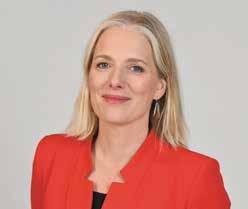
39
Sophie Perreault, BCL’93, LLB’93, a été intronisée au prestigieux American College of Trial Lawyers. Associée chez Langlois Avocats et présidente de son conseil d’administration, Me Perreault a également été nommée parmi les Étoiles du litige 2022 de Benchmark Litigation Canada

L’hon. Marie-Claude Rigaud, BCL’92 LLB’92, a été nommée juge puînée de la Cour supérieure du Québec à Montréal. Avant sa nomination, elle était professeure à la Faculté de droit de l’Université de Montréal.
Lisa Shemie, BCL’94, LLB’94, was named general counsel and corporate secretary at OANDA. Responsible for overseeing the firm’s legal function worldwide, she also sits on its executive committee from her base in New York.
Itai Sneh, LLB’93, associate professor in world civilizations, human rights, and international law at the History Department of the John Jay College of Criminal Justice, City University of New York, is using his sabbatical to research his book The Encrusted Underside of Glory? The book explores injustice, inequality, and struggles in American legal history.
L’hon. Daniel Urbas, BCL’91, LLB’91, a été nommé juge puîné de la Cour supérieure du Québec à Montréal. Il était auparavant associé chez Borden Ladner Gervais, où il a dirigé la pratique de litige en propriété intellectuelle à l’échelle nationale.
2000’s
Kathy Bellefleur, DCL’00, a été nommée professeure de droit civil à la Faculté de droit de l’Université Laval. Elle s’intéresse aux théories de la propriété, au droit des biens, au droit comparé et aux traditions autochtones.
Mathieu Bouchard, BCL/LLB’00, joined KPMG LLP, in Montreal, as executive director and leader, impact strategy industrial and commercial innovation, where he is focused on positioning the firm and its clients at the forefront of technological and environmental changes.
Marie-Claire Cordonier Segger, BCL’02, LLB’02, was elected a fellow of the Royal Society of Canada. A pioneer in sustainable development law and governance, she is a full professor at the School of Environment, Enterprise and Development at the University of Waterloo.
L’hon. Mélanie Dugré, BCL’00, LLB’00, a été nommée juge à la Cour du Québec. Au moment de sa nomination, elle était vice-présidente adjointe aux affaires juridiques de la compagnie d’assurance Canada Vie.
SARAH WOODS, BCL/LLB’03, was named a fellow of the American Bar Foundation, an honorary organization of lawyers, judges, and legal scholars whose public and private careers have demonstrated dedication to the highest principles of the legal profession and the welfare of their communities. She has joined McCarthy Tétrault as a litigation partner.
L’hon. Philippe de Grandmont, LLM’06, a été nommé juge à la Cour du Québec. Au moment de sa nomination, il était directeur des affaires juridiques à l’Autorité régionale de transport métropolitain.
Natalka Haras, BCL/LLB’09, senior counsel at ADP Canada, was selected as a fellow of the Leadership Counsel on Legal Diversity by ADP’s Global Legal and Compliance Departments.
The Hon. AZIM HUSSAIN, BCL’00, LLB’00, has been appointed puisne judge of the Superior Court of Quebec for the district of Montreal. He previously was a partner at Montreal law firm NOVAlex.

Shaun E. Finn, BCL/LLB’02, partner at BCF and co-leader of the firm’s Class Action Defence group, joined the International Association of Defense Counsel, an invitation-only global legal organization for attorneys who represent corporate and insurance interests. He was named a fellow of the Litigation Counsel of America in 2021.
Joseph P. Hillier, BCL/LLB’08, was named one of Canadian Lawyer’s Top 25 Most Influential Lawyers of 2021. He is chief of staff in the Ontario Ministry of the Attorney General.
Claudie Imbleau-Chagnon, LLM’07, a été nommée présidente du conseil d’administration du Musée d’art contemporain de Montréal. Elle est vice-présidente aux investissements et aux affaires juridiques chez Ivanhoe Cambridge, où elle a débuté en 2015 à titre de consultante.
40 ALUMNOTES FOCUS LAW / 2022-2023 / M C GILL UNIVERSITY
Reisa Khalifa , BCL/LLB’02, was appointed a full-time member of the Refugee Appeal division of the Immigration and Refugee Board, Canada’s largest administrative tribunal, where she has worked since 2018.
Amar Khoday, LLM’08, DCL’14, is an associate professor at the University of Manitoba’s Faculty of Law. He is the 2021 recipient of the Terry G. Falconer Memorial Winnipeg Rh Institute Foundation Emerging Researcher Award in the Humanities category. His article “Black Voices Matter Too: CounterNarrating Smithers v The Queen” was published in the Osgoode Hall Law Journal in December 2021.
Eva Krajewska, BCL/LLB’08, joined Henein Hutchison as partner. She practices civil litigation, public and administrative law, appellate advocacy, and estate disputes. She has been recognized in the Best Lawyers in Canada directory in Appellate Practice since 2020 and in Administrative and Public Law in 2022, and was named a Lexpert Rising Star: Leading Lawyer under 40 in 2021.
Manon Lavoie, LLM’03, a été nommée présidente de conseil de discipline du Bureau des présidents des conseils de discipline. Elle est avocate associée chez Therrien Couture Joli-Cœur. Avant son admission au barreau en 2009, elle a été chargée de cours aux facultés de droit de l’Université de Sherbrooke et de l’Université d’Ottawa.
Ali Martin-Mayer, BCL/LLB’02, a été nommée directrice des admissions et du recrutement pour l’Université McGill. Après avoir occupé divers rôles administratifs à la Faculté de droit de 2006 à 2017, dont celui de doyenne adjointe aux admissions, Me Martin-Mayer a pratiqué le droit comme avocate au service juridique de McGill de 2017 à 2022.
L’hon. David E. Roberge, Ad E, BCL’01, LLB’01, alors qu’il était associé chez McCarthy Tétrault, a reçu le Prix Paris Québec, décerné par Justice Pro Bono Québec et le Barreau de Paris Solidarité. Son conseil juridique auprès de personnes vivant avec le VIH-sida, sa collaboration avec Avocats sans frontières en Haïti et son implication sur des enjeux d’égalité auprès des communautés LGBTQ ont été soulignés lors de la remise du prix.
Samuel Singer, BCL/LLB’09, LLM’11, was co-recipient of the Canadian Bar Association’s Sexual Orientation and Gender Identity Community Section Hero Award, which recognizes excellence within the legal profession in advancing the cause of equality for LGBTQ2+ people. Singer is assistant professor at the University of Ottawa’s Faculty of Law.
Law alumni appointed M c Gill Governors
MARYSE BERTRAND, Ad E, BCL’80, has become the first woman to chair McGill University’s Board of Governors. She had previously served as memberat-large of the board (2016-2018) and board vice-chair (2018-2022). Me Bertrand brings a wealth of experience as a lawyer, and as a corporate director she is on the board of grocery store chain Metro Inc, and National Bank, among others. A former partner at Davies Ward Phillips & Vineberg, Bertrand received the Quebec Bar Association’s Advocatus Emeritus distinction for her exceptional contribution to the practice of law.

Robust contributions to university governance by other members of the McGill Law community have included terms as chair by STUART “KIP” COBBETT, BCL’72, LLD’19 (2010-17) and DICK POUND, CC, OQ, QC, FCA, BCL’67, LLD’09 (1994-99).
Carrying on this tradition, GREGORY DAVID, BCL’93, LLB’93, ARIEL DECKELBAUM, BCL’98, LLB’98, and DILETTA PRANDO, BCL’87, LLB’87, have been appointed members-at-large of the Board.
STEPHEN HALPERIN, BCL’75, LLB’78, and FRED HEADON, BCL’96, LLB’96, have been serving as governors since 2012 and 2020, respectively.
SAMUEL MINZBERG, BCL’73, LLB’79, has been named governor emeritus, after having served since 2011.
The Board of Governors is the University’s highest governing body. Composed of 25 voting members, and two observers, it has final authority over the conduct of all academic, business, and financial affairs of the University.
41
SARA ROSS, BCL/LLB’12, was named one of the Top 25 Most Influential Lawyers by Canadian Lawyer Magazine and was a recipient of the Rising Stars: Leading Lawyers Under 40 award by L’Expert in late 2021. She was the co-editor-in-chief of the Canadian Legal Education Annual Review, treasurer of the Canadian Association of Law Teachers, and vice-president of the Canadian Law and Society Association. She has been an assistant professor at the Schulich School of Law at Dalhousie University since September 2021.
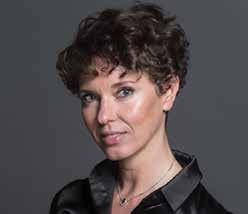
Pierre-Hugues Verdier, BCL’01, LLB’01, has become a member of the American Law Institute. A professor at the University of Virginia School of Law, he specializes in public international law, banking and financial regulation, and international economic relations.
Erin Zipes, BCL/LLB’03, was appointed as 1Password’s first chief legal officer to help the company scale to meet demand for its security solutions. She co-founded the angel investing collective Backbone Angels, which is dedicated to funding and empowering female and non-binary founders.
2010’s
Katarina Daniels, BCL/LLB’15, has joined Davies Ward Philips & Vineberg as manager of library services and research lawyer. She worked at the Nahum Gelber Law Library from 2019 to 2021, among other things teaching advanced legal research and legal technology workshops during Focus Week. In winter 2023, she will return to the Faculty of Law to teach legal research to the first-year class.
Rachel Davidson, BCL/LLB’16, took on the role of senior associate at Georgetown Law Center’s Center on Privacy and Technology, where she leads their research and advocacy on the surveillance of immigrant communities. Her article “The Racial Justice Imperative to Reimagine Immigrant Children’s Rights: Special Immigrant Juveniles as a Case Study” was published in 2022 in the American University Law Review.
Patrick Garon-Sayegh, BCL/LLB’10, LLM’17, a été nommé professeur en droit judiciaire à la Faculté de droit de l’Université de Montréal. Ses travaux s’intéressent à des questions fondamentales liées à la preuve et situées à l’intersection de la philosophie des sciences, de la philosophie du droit et de la rhétorique. Il étudie notamment comment la preuve et l’expertise scientifique sont mobilisées dans le cadre de désaccords de nature médicale.
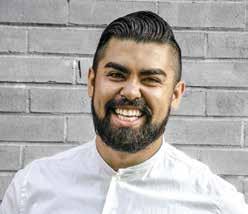
·
Vague de nominations à la magistrature
· L’honorable Catherine Piché, DCL’11
· L’honorable David E. Roberge, Ad E, BCL’01, LLB’01
, BCL/LLB’16,
42 FOCUS LAW / 2022-2023 / M C GILL UNIVERSITY ALUMNOTES
Le 11 octobre, quatre membres de la communauté diplômée ont été nommés juges à la Cour supérieure du Québec :
· L’honorable Renée Thériault, BCL’93, LLB’93
L’honorable Janet Michelin, BCL’96, LLB’96
JEANSIL BRUYÈRE
was appointed to the board of Fierté Montréal Pride and co-chair of the Canada Pride 2022 Human Rights Conference hosted by Winnipeg Pride. He is a board member at the Immigration and Refugee Board of Canada, Eastern Region.
JINNIE LIU, BCL/LLB’17, s’est jointe à la pratique en droit fiscal de Stikeman Elliott. Elle prête conseil à des entreprises au Canada et à l’étranger sur tous les aspects du droit fiscal. Son travail se concentre particulièrement sur les questions transactionnelles touchant les fusions et acquisitions et les réorganisations d’entreprises.
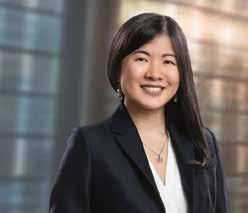
James Gibson, BCL/LLB’11, joined Naymark Law as partner, after working as litigation counsel for the Ontario Securities Commission, where he carried out administrative prosecutions under the province’s Securities Act. His practice includes a wide range of matters, including corporatecommercial litigation, regulatory proceedings, and professional liability matters.
Michael Gilson, LLM’13, has been made partner at Davis Polk in New York. A member of the Mergers & Acquisitions practice, he advises U.S. and international corporate and private equity clients on a range of public and private transactions, domestic and cross-border.
Émilie Horrocks-Denis, BCL/LLB’18, has left private practice in Montreal and joined the federal civil service as a senior policy advisor with the Department of Finance. She is working for a division of the Tax Policy Branch responsible for intergovernmental taxation agreements, a role that enables her to draw on her background in law and political science.
Alexandra Klein, LLM’11, a joint le Mouvement Desjardins comme leader de pratique du département d’immigration d’affaires, après avoir pratiqué le droit de l’immigration pendant 10 ans, notamment chez Campbell Cohen Worsoff, BCF et Gomberg Dalfen.
Anne Iavarone-Turcotte, LLM’15, DCL’21, a reçu trois récompenses pour sa thèse doctorale : le prix de la meilleure thèse de l’Association des doyennes et des doyens des études supérieures au Québec, la médaille d’or de la Gouverneure général et le McGill Alumni Association Graduate Award.
Gregory Ko, BCL/LLB’11, a partner at Kastner Lam who practices civil litigation, received a 2022 Precedent Setter Award from Precedent Magazine. The publication highlighted his commitment to defending people contending with discrimination, employment termination, and harassment.
Michael Lang, BCL/LLB’18, LLM’22, has taken up a position as advisor in the Office of the Conflict of Interest and Ethics Commissioner, Parliament of Canada.
Sandra Aigbinode Lange, BCL/LLB’14, was named one of Calgary’s Top 40 under 40 by Avenue Magazine. A litigator at McCarthy Tétrault since 2017, she was previously a crown prosecutor in Alberta.
John Lennard, BCL/LLB’11, has joined Stikeman Elliott in Toronto as a partner in the Tax Group.
Jae-Yeon Lim, BCL/LLB’11, welcomed baby daughter Freya Adaline Rourke. She celebrated her 10th year of practice in Canadian immigration law and was a presenter on “Addressing Racism & Unconscious Bias in the Practice of Immigration Law” at the Canadian Bar Association’s National Immigration Conference.
University from 1988-1998, teaching in the areas of public, private and family law.
ALAIN BABINEAU, BCL/JD’19, took on the role of director of racial profiling and public security at the Red Coalition. A retired RCMP officer, he is a well-known expert on racial profiling who was hired last year by Montreal’s commissioner on racism and systemic discrimination to promote change within the force.
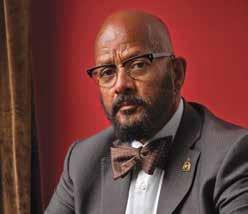
Ngozi Okidegbe, BCL/LLB’15, joined Boston University as the first professor dually appointed to the School of Law (associate professor) and the Faculty of Computing and Data Sciences (assistant professor).
Kiran Ross, BCL/LLB’15, s’est jointe au Directeur des poursuites criminelles et pénales du Québec à titre de procureure. Sa pratique est dédiée aux causes longues et complexes en matière criminelle et pénale.
43
Sophie Roy-Lafleur, BCL/LLB’11, s’est jointe à Latitude Management à titre de directrice, ressources professionnelles et recrutement. Elle a précédemment dirigé le Centre de développement professionnel de la Faculté de droit pendant quatre ans (et elle nous manque gros !).
Don-Ray Simmonds, BCL/LLB’12, became a registered EU Trademark Agent. He lives in France and the United Kingdom.
Priyanka Timblo, BCL/LLB’13, is a partner at Holwell Shuster & Goldberg (HSG) in New York. She practiced at HSG from 2017 to 2021, contributing to a number of the firm’s major litigation victories, and returned to HSG in 2022 after a stint at Omni Bridgeway in global legal finance and risk management. She was part of the HSG trial team that successfully represented Valassis, a MacAndrews & Forbes company, as plaintiff in a high-stakes antitrust jury trial against News Corp.
Gabrielle Tremblay, BCL/LLB’17, a été nommée conseillère juridique senior à la Banque Nationale. Me Tremblay est également conseillère juridique bénévole pour l’organisme Dis-Moi.
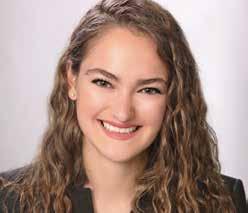
RÉGINAL LABONTÉ, BCL/JD’20, s’est joint à Latitude Management, une entreprise spécialisée en prévention et gestion du harcèlement et de la violence en milieu de travail fondée par ANAÏS LACROIX, BCL/LLB’11.
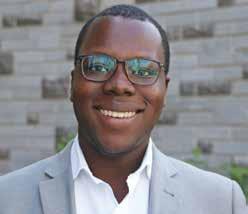
Éric St-Pierre, BCL/LLB’10, a reçu le titre Avocat.e JBM de l’année 2021 du Jeune Barreau de Montréal. Il dirige la Fondation familiale Trottier, l’une des plus importantes fondations en changement climatique au Canada. Il a joué un rôle clé dans la création de la Ligue des communautés canadiennes sobres en carbone, et a établi le Fonds climat du Grand Montréal. Il a contribué au développement du Plan climat de la Ville de Montréal, qui vise la carboneutralité en 2050, et au Partenariat Climat Montréal.
Ma’n H. Zawati, DCL’19, has published Reciprocity in Population Biobanks: Relational Autonomy and the Duty to Inform in the Genomica Era (Elsevier, 2021). He is an assistant professor at McGill University’s Faculty of Medicine and Health Sciences and the executive director of the Centre of Genomics and
ANGELA SWAN, OC, LLD’21, was named an Officer of the Order of Canada in December 2021. A distinguished legal scholar, practitioner, teacher, mentor, and an acclaimed figure in Canadian contract law and the Canadian legal community more broadly, she was awarded a Doctor of Law, honoris causa, by McGill University at one of the fall 2021 convocation ceremonies.
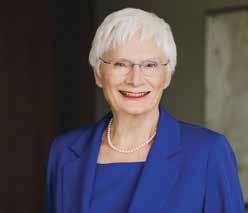
Policy. His work is interdisciplinary, drawing together perspectives from law, ethics, bioinformatics, genomics, and policy.
2020’s
Joshua Blatt, BCL/JD’21, sociétaire en droit des sociétés chez Osler, s’est hissé au sommet du Tableau d’honneur de l’excellence de l’École du Barreau en obtenant les meilleurs résultats aux examens pour l’année 2021.
Nikolas De Stefano, BCL/JD’20, joined Lenczner Slaght as associate in March. He previously served as law clerk at the Supreme Court of Canada for Justice Rosalie Abella.
Larissa Parker, BCL/JD’21, won the silver award in the 2021 Global Climate Law and Governance Student Essay Competition for her essay “Latest Developments in Emission Trading.”
44
FOCUS LAW / 2022-2023 / M C GILL UNIVERSITY ALUMNOTES
NICOLE SPADOTTO, BCL/JD’21, won the Canadian Bar Association’s 2021 Bill Miller Memorial Award for her co-authored paper “Digital Advertising and Purchasing: Fun or a New Type of Deception.” The award is bestowed annually for up to two of the best articles published in the Canadian Competition Law Review.
The Chancellor Day Circle
Named in honour of Charles Dewey Day, first chancellor of McGill University and, as one of the codifiers, a central figure in the civil law of Quebec, the Chancellor Day Circle was founded in 2017 to acknowledge the Faculty’s most significant donors. Admission to the Circle is bestowed on donors who have given $100,000 or more to the Faculty of Law.
La Faculté de droit remercie les membres du Cercle Chancellor-Day pour leur soutien inestimable :
A. Jean de Grandpré, CC
Alex Kam-Wah Woo
The Amiel Foundation
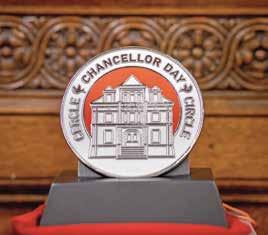
Anna Loparco
Anne-France Goldwater
Anna Yang & Joseph Schull
Ariel & Catherine Deckelbaum
Beaverbrook Canadian Foundation Blake, Cassels & Graydon LLP
The Blema & Arnold Steinberg Foundation
BMO Financial Group
The Boeing Company
Borden Ladner Gervais LLP
Christopher Hoffmann & Joan Eakin
Clive & Barbara Allen & Family
The Chawkers Foundation
Colin Stephen Baxter & Rachel Ralston Baxter
David Johnston
David P. O’Brien, OC
David W. Binet
Davies Ward Phillips and Vineberg LLP
Donald E. Meehan
Donner Canadian Foundation
The Hon. E Leo Kolber, OC
Éric St-Pierre
Fasken
Fondation J A DeSève
Gregory J. David Hillel Rosen & Liane Feldman
Ian Cuillerier
Ian C. Pilarczyk
IMK LLP/S.E.N.C.R.L.
Isabelle Marcoux
James A. Robb, QC, Ad.E.
James A. Woods
The Hon. James C K-Hugessen, CM Jordan & Caren Waxman
Kugler Kandestin LLP
LGBT Purge Fund
The Hon. L. Yves Fortier PC, CC, OQ, QC
Li Ka-Shing (Canada) Foundation
Marcel J. Arsenault & Cynda Collins-Arsenault
Mark A. Godsy
Marlene & Joel King
Maryse D Bertrand, Ad. E. & M. William Brock, Ad. E.
Masao Sekiguchi
McCarthy Tétrault LLP
The McConnell Foundation McMillan S.E.N.C.R.L., s.r.l./LLP
Merle Wertheimer & Sam Hornstein
Mitch Garber & Anne-Marie Boucher
Mitzi and Mel Dobrin Family
Nahum Gelber, QC
Norton Rose Fulbright Canada LLP
Osler Hoskin & Harcourt LLP
Penny & Gordon Echenberg
Peter D. Nesgos
Philippe Lette Québecor inc
Richard Aftanas
Richard Bogoroch
Rio Tinto
Robert L. Katz & Christina H. Otto
Robert L. Raich & Marlene Raich
Robert Raizenne
Roderick A. Macdonald & Shelley Freeman
Roy L. Heenan, OC
Scott Henderson
Sophie Nappert
Stephen Allan Scott
Stephen Halperin & Andrea Morris Halperin
Stikeman Elliott LLP
Susan Wells Tunnell & David Tunnell
William Friedman
Le don d’une vie Forgé par vous Forgé par McGill
“The scholarships I received were instrumental in helping me through McGill; I want to help future students who might not otherwise be able to attend. That’s why I’m leaving a legacy gift – a bequest in my will – to McGill.”
Quel sera votre héritage?
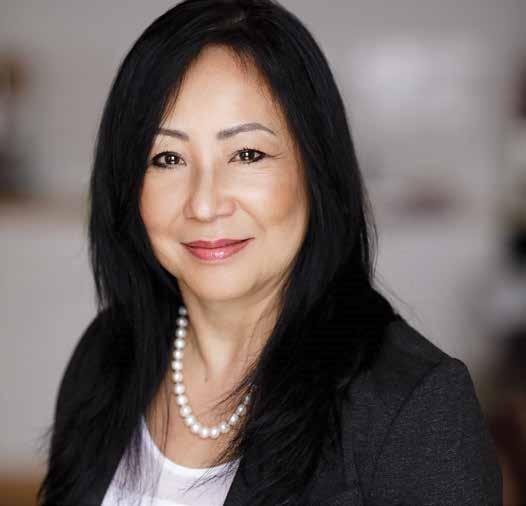
1430, rue Peel, Montréal (Québec) H3A 3T3, Canada mcgill.ca/pg 1.800.567.5175 514.398.3560 plannedgifts.dev@mcgill.ca Canada Post Corporation Publications Mail Agreement 40613662
Kathy Nakashima BSc’77, BCL/LLB’81 Legacy gift donor























 By Patrick McDonagh
Photos by Kejic Productions
By Patrick McDonagh
Photos by Kejic Productions







 By Maeve Haldane
By Maeve Haldane



















 By Aminata Mboup & Karell Michaud Photos by Dee M’Bow
By Aminata Mboup & Karell Michaud Photos by Dee M’Bow








 By Karell Michaud Photos by Owen Egan / Joni Dufour
By Karell Michaud Photos by Owen Egan / Joni Dufour











 (en haut) Poursuivant une tradition chère à la Faculté de droit, cette réception a marqué sur une note joyeuse l’entrée de la nouvelle cohorte dans la communauté internationale des diplômé.e.s en droit de McGill.
(en haut) Poursuivant une tradition chère à la Faculté de droit, cette réception a marqué sur une note joyeuse l’entrée de la nouvelle cohorte dans la communauté internationale des diplômé.e.s en droit de McGill.


 H. Waxman , BA’86, LLB’91, BCL’92 2022 E. P. TAYLOR
H. Waxman , BA’86, LLB’91, BCL’92 2022 E. P. TAYLOR

























